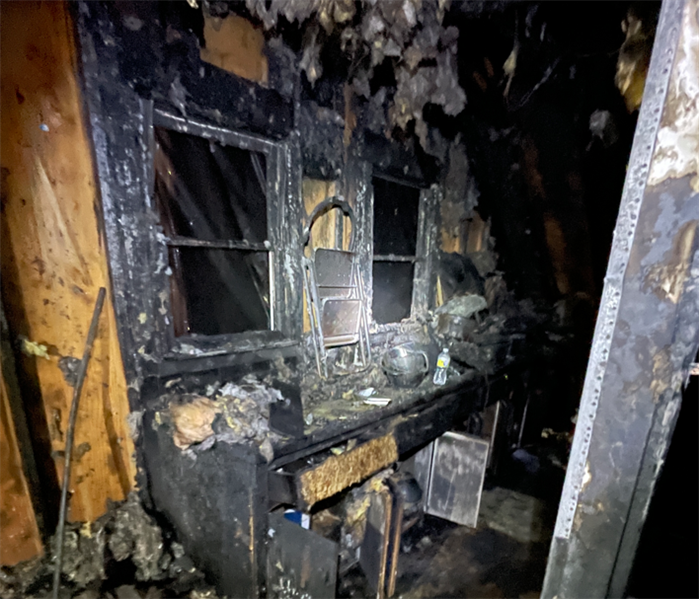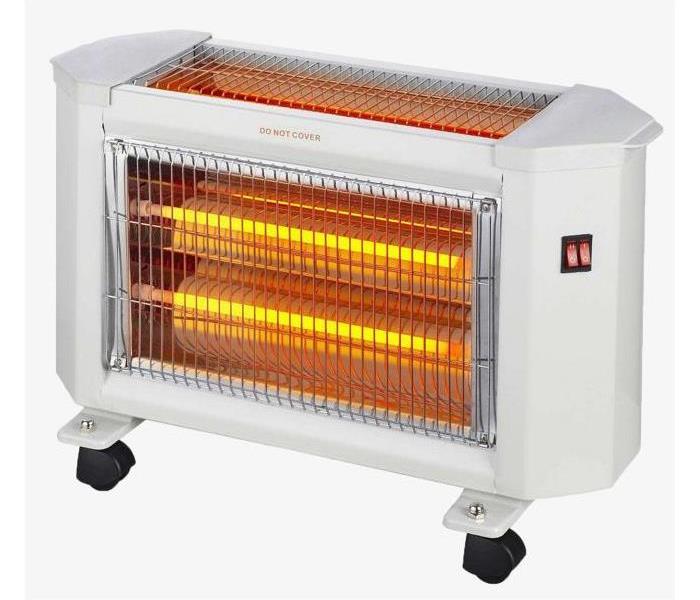Recent Fire Damage Posts
Fire Prevention Month
9/27/2024 (Permalink)
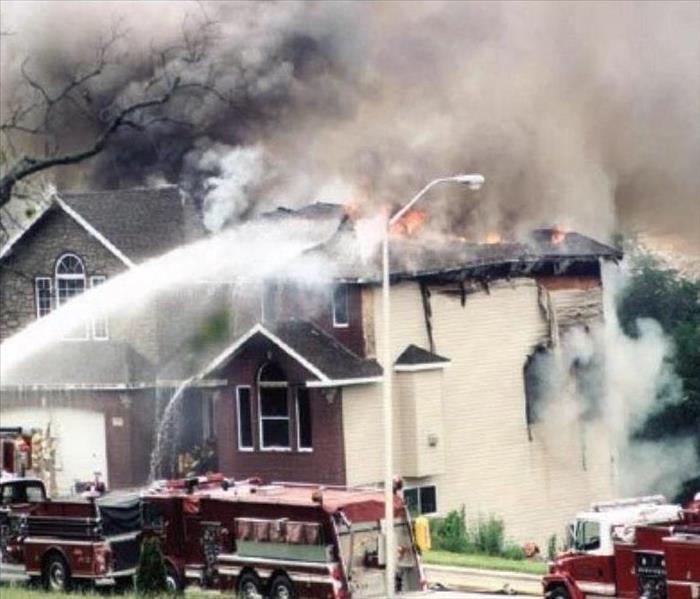 Stay prepared and stay safe. Fire safety should be practiced regularly.
Stay prepared and stay safe. Fire safety should be practiced regularly.
October is just around the corner, and it is also Fire Prevention Month. October is the perfect time to examine your family's emergency preparedness plans for your home as well as your business. Also look into the status of your fire escape plan. Practice your escape plan regularly. It's a good idea to learn at least two ways out of every room and be sure all doors and windows that could be used to exit the room are open easily and are free of clutter and debris.
Look for places within your home fires could potentially start. Identify possible fire hazards and safely take care of them. Be sure to have a safe outside meeting space in the event of an emergency evacuation.
And as always, don't forget to check your smoke detectors and test them periodically. Get used to the noise they make. This is also a good time to check your fire extinguishers.
It's always a good idea to prepare for a fire emergency before it happens. Stay prepared and stay safe.
Ready for Whatever Happens
9/12/2023 (Permalink)
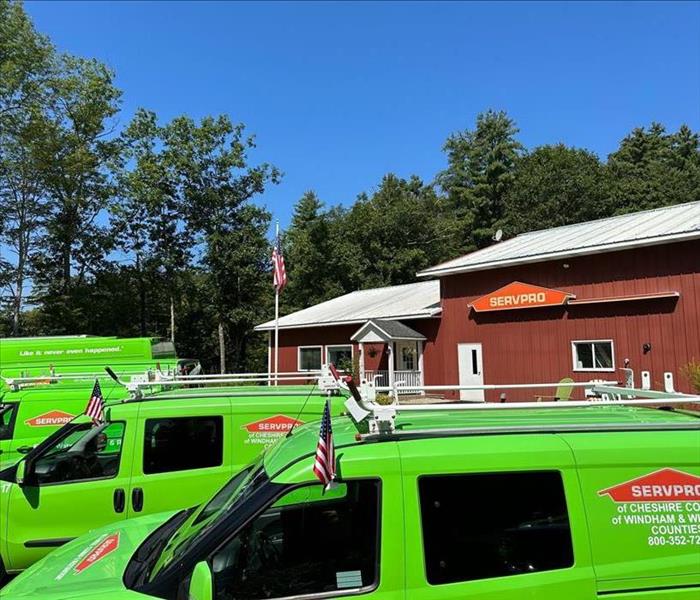 SERVPRO of Cheshire County: Ready for whatever happens and here to make fire and water damage "Like it never even happened."
SERVPRO of Cheshire County: Ready for whatever happens and here to make fire and water damage "Like it never even happened."
SERVPRO of Cheshire County has been proudly serving the area since 1978. Our skilled and highly trained team provides prompt, professional services to your property following fire, smoke, water, or mold damage.
Our project managers, production technicians, and even members of our office staff carry industry-related certifications from the IICRC (Institute of Inspections Cleaning and Restoration Certification) in areas of Water Restoration, Applied Microbial Remediation, Trauma and Crime Scene Restoration, and Fire & Smoke Restoration, to name a few. Our skilled team is ready to assist when disaster strikes, 24/7/365.
If you experience one of these types of emergencies at your home or commercial property, contact the cleanup and restoration team that's faster to any size disaster. SERVPRO of Cheshire County: making fire, smoke, water, and mold damage "Like it never even happened."
Fire/Smoke Restoration: The Most Thorough Cleaning Available!
5/16/2023 (Permalink)
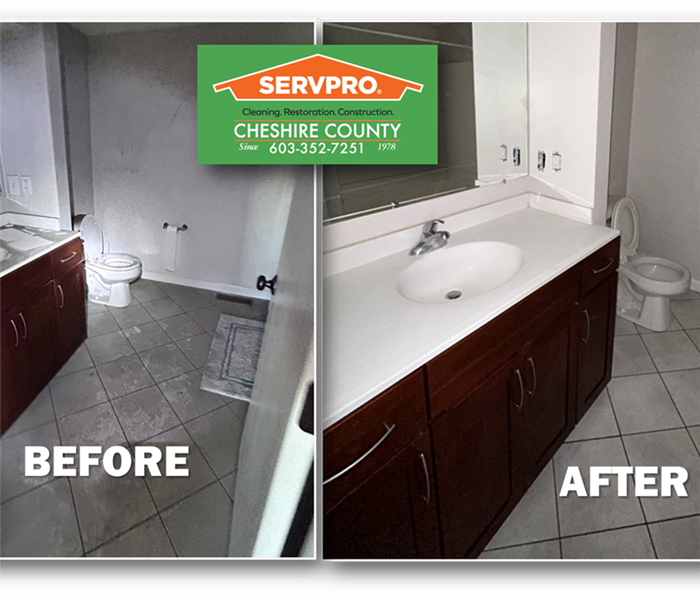 SERVPRO of Cheshire County uses industry leading methods and specially formulated products made to battle the heaviest smoke damage.
SERVPRO of Cheshire County uses industry leading methods and specially formulated products made to battle the heaviest smoke damage.
Cleaning and restoration following a fire or smoke damage can be challenging. SERVPRO of Cheshire County uses a multi-step approach when cleaning heavy smoke. The SERVPRO Team first performs a dry-cleaning method to remove the majority of oily smoke residue from a given surface. This is followed by a wet cleaning performed by our technicians using SERVPRO's own specially formulated cleaning products. This is performed on most hard surfaces such as wood, metal, marble, and porcelain to name a few. Why is this important? If wet cleaning was performed prior to dry cleaning when attacking harmful soot, it is very likely that the process will spread the residue and smudge the surface. By using basic, over-the-counter products, that are not made specifically for handling soot, there is a high risk that it will stain thus making it more difficult, or impossible, to completely remove. If you experience a fire or smoke damage to your home or commercial property, contact the professionals at SERVPRO of Cheshire County to be sure you are getting the most advanced cleaning methods, by industry certified technicians, who use only products created specifically for fire and smoke damage restoration. SERVPRO of Cheshire County, making fire and smoke damage "Like it never even happened."
Kitchen Fire: Residential Fire Mitigation Project
1/24/2023 (Permalink)
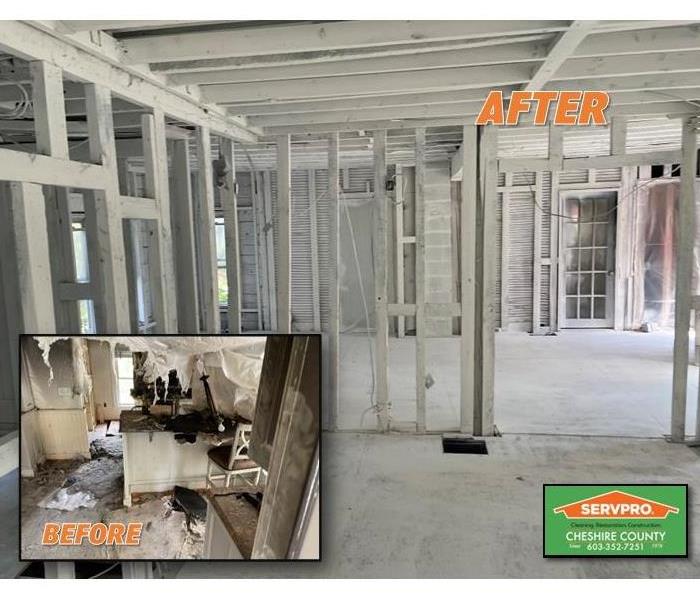 Fire mitigation projects can be very complex with several different phases. We can help!
Fire mitigation projects can be very complex with several different phases. We can help!
Recently, our team here at SERVPRO of Cheshire County received a service request for emergency mitigation services following a kitchen fire at a local residence. The fire originated and caused the most significant damage in the kitchen, but there was heavy contamination from smoke throughout the rest of the home. Luckily no one was injured in the fire.
There were multiple phases throughout the project with the first being the packing and removal of salvageable belongings and furniture to our location to be cleaned and deodorized. Items that were unable to be restored were inventoried and disposed of. The next step was to remove all the building materials that were damage from the fire. Our team carefully removed, bagged, and discarded these materials. All other areas were then professionally cleaned. While all of this was taking place, we installed large air scrubbing devices and deodorizing machines to assist with odor removal. Lastly, we applied a coat of our smoke sealant product in all areas where demolition was performed.
In the end, the areas were completely deodorized, sealed, and ready for reconstruction. Once the reconstruction phase is completed by a contractor, our team will deliver the furniture and belongings back to the property.
Fire Damage: Timely Response Matters
12/29/2022 (Permalink)
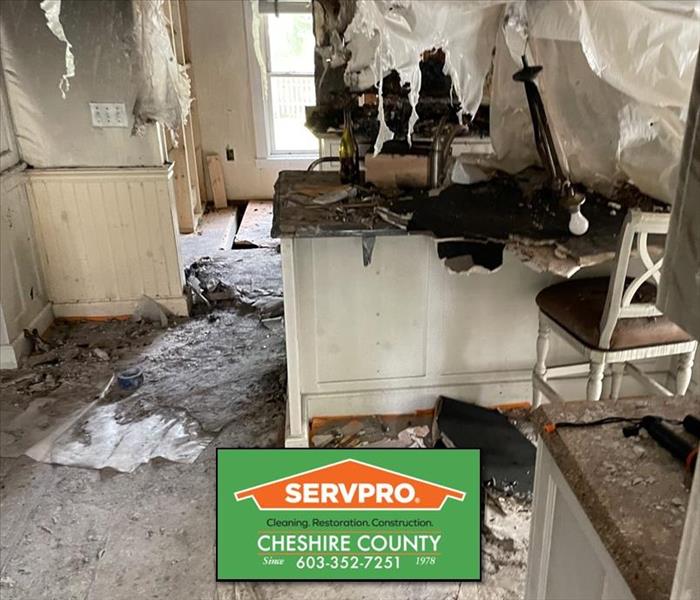 For emergency restoration following fire and smoke damage, contact SERVPRO of Cheshire County.
For emergency restoration following fire and smoke damage, contact SERVPRO of Cheshire County.
SERVPRO of Cheshire County is the emergency cleanup and restoration team that is "Faster to Any Sized Disaster." The first 48 hours following a fire in a residential or commercial property are critical when it comes to restoring versus replacing damaged building materials and personal belongings. Swift response and timely mitigation can help to prevent fire damage from creating long-term issues.
SERVPRO of Cheshire County understands "getting back to normal" is one of your primary concerns. Our highly trained staff is ready to get your property back to how it was before the fire. Quick response coupled with the use of industry- leading products and equipment will ensure your home or commercial property is back up and running quickly and professionally.
If you experience a fire in your home or commercial property, be sure to contact the company that's faster to any sized disaster, SERVPRO of Cheshire County.
Thanksgiving Cooking Safety
11/15/2022 (Permalink)
 Have a safe and enjoyable Thanksgiving!
Have a safe and enjoyable Thanksgiving!
Once the summer wraps up and the children head back to school, it seems like we're Thanksgiving planning in no time. Thanksgiving is a great time to reflect, be thankful, and of course, enjoy delicious food and recipes with those you care about most. It's a relaxing, pleasant way to being the holiday season.
When preparing those Thanksgiving feasts, make sure to do so carefully. The kitchen can be a dangerous place and even more so when cooking for a large group. Here are a few safety tips to keep in mind:
- Make sure your smoke alarms are working. Test them by pushing the test button.
- Stay in the kitchen when cooking on the stove so you can keep an eye on the food.
- Keep children away from the stove. The stove will be hot, and kids should stay three feet away.
- Keep matches and utility lighters out of reach of children.
- Never leave children alone in the room with a lit candle.
- Stay in the home when cooking your turkey and check it frequently.
Keep these tips in mind to be sure your Thanksgiving is fun and safe!
For more info regarding Thanksgiving safety, visit the National Fire Protection Association.
Autumn Fire Safety
10/28/2022 (Permalink)
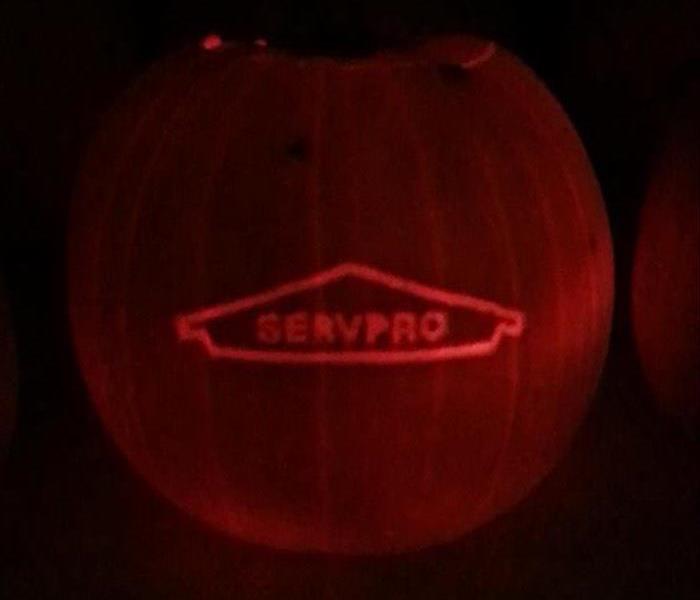 Enjoy this fall season safely!
Enjoy this fall season safely!
Fall is a beautiful time, especially right here in New England. The weather is crisp, the color from foliage is breathtaking, and outdoor activities are all around us. Not to mention, Labor Day Weekend, Halloween, and Thanksgiving: something for everyone to enjoy! But it's important to enjoy safely. Here are a few safety tips to consider this fall season:
- Keep fall decorations away from open flames and heat sources.
- Keep emergency exits clear of decorations and clutter.
- Regarding Halloween costumes: teach children to stay away from open flames. Make sure they know how to stop, drop, and roll if their clothing catches fire.
- Additionally, consider choosing Halloween costumes that made of material that won't easily ignite when in contact with heat or a flame.
- Use a flashlight or battery-operated candle in a jack-o-lantern. Use caution if using a real candle. Place lit pumpkins away from anything that can burn.
Keep these tips in mind to ensure your fall season is fun AND safe.
National Preparedness Month: Facts About Home Fires
9/29/2022 (Permalink)
September is National Preparedness Month and today we're looking at some facts regarding home fires. House fires are caused by a number of things but not matter the origin, fire travels fast through a home.
- Fire is Fast! In less than 30 seconds, a small flame can grow into a major fire. In minutes, a house can be fully engulfed in flames.
- Fire is Hot! Heat is more threatening than flames. Room temperature in a fire can be 100 at floor level and can rise to as much as 600 degrees at eye level.
- Fire is Dark! It starts bright, but quickly produces black smoke and creates a complete blanket of darkness throughout the home.
It is important to remember to install smoke alarms on every level of a home, especially inside bedrooms and outside sleeping areas. Testing smoke alarms should be done every month and if they're not working, replace the batteries and test again. Rehearsal of a fire escape plan with your family is also incredibly important. As mentioned earlier, fire begins light but quickly becomes dark due to smoke and rehearsing an escape route regularly will make it easier to navigate out of the property. Also, have a specific meeting place once everyone has exited the building.
For more tips about home fire safety, please visit American Red Cross and Ready.gov.
Multi-Phase Fire Restoration Project
8/18/2022 (Permalink)
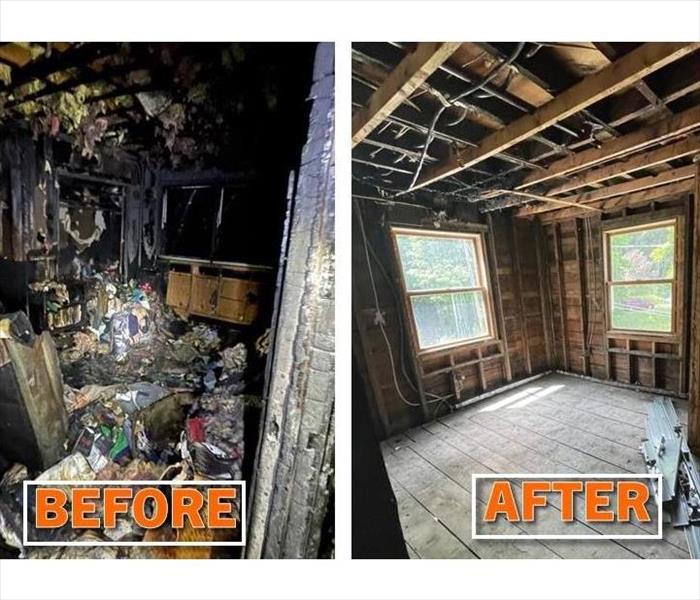 SERVPRO of Cheshire County, working hard to make fire and water damage "Like it never even happened."
SERVPRO of Cheshire County, working hard to make fire and water damage "Like it never even happened."
Recently, the SERVPRO of Cheshire County mitigation team was asked to assist a local property owner following a fire. The property is a multi-tenant building, and the fire originated on the second floor. The fire smoldered and caused high levels of smoke throughout the upper level. Eventually, flames began to develop and damage parts of the building's structure. The local fire department swiftly arrived and effectively extinguished the fire using their tanker trucks. When the area was cleared, the property had sustained smoke, fire, and water damage on multiple levels.
There were several phases in the mitigation project following this fire event. First, the SERVPRO team gathered and discarded of items and belongings that were deemed "unsalvageable" and beyond repair. Items that were able to be salvaged were carefully boxed and removed from the building where they were stored to be cleaned and deodorized by our trained personnel. Dehumidifiers were brought in to accelerate the drying process and other machines were installed to begin deodorizing the damaged areas.
Areas of the building that were unaffected by fire, smoke, and water were contained and blocked off with plastic to prevent cross contamination. Our team then proceeded with demolition services to damaged building materials such as drywall, insulation, flooring, doors, trim, and even some cabinetry and lighting. The deconstructed materials were carefully removed from the property and discarded.
Lastly, the exposed portions of the building that were now open following demolition were cleaned and deodorized thoroughly. The property is now dry, deodorized, cleaned and ready for repair.
This project involved many steps and phases but our SERVPRO of Cheshire County team was up to the task. No project to large or small. We're here to make fire and water damage "Like it never even happened."
Residential Fire Damage Restoration
4/12/2022 (Permalink)
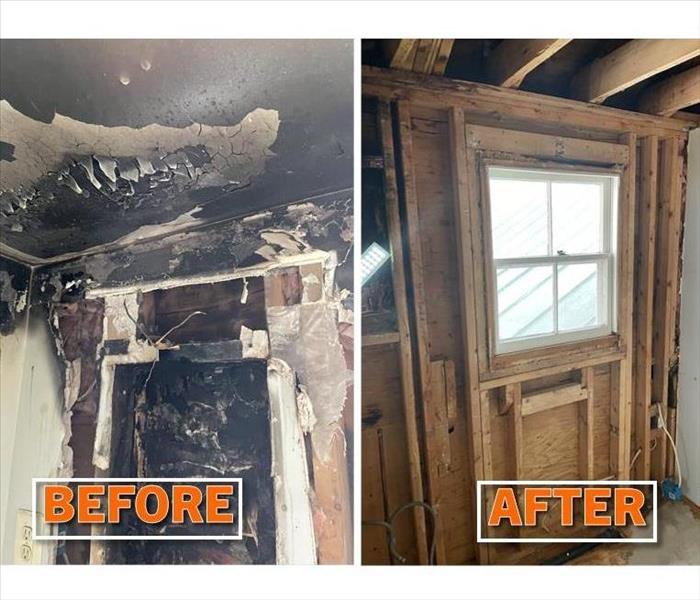 Using strategic demolition, cleaning, and deodorization methods, SERVPRO of Cheshire County was able to remedy this residential fire damage project.
Using strategic demolition, cleaning, and deodorization methods, SERVPRO of Cheshire County was able to remedy this residential fire damage project.
Recently, the SERVPRO of Cheshire County Team performed cleaning and restoration services at a home that had experienced a chimney fire. Thankfully, no one was injured during the fire. There was minor structural damage but high amounts of smoke. The heaviest damage occurred in the master bath which required partial demolition, but smoke and fire extinguisher residue traveled throughout the rest of the home which was cleaned and deodorized. SERVPRO technicians used industry recommended techniques to properly remove the residue. Following demolition of the areas where structural damage had occurred, our team used a combination of dry and wet cleaning methods to remedy the smoke, soot and extinguisher dust. We're grateful to have had the opportunity to assist our client following this traumatic event. We're here to help and make fire and smoke damage "Like it never even happened."
Kitchen Burn Safety
2/25/2022 (Permalink)
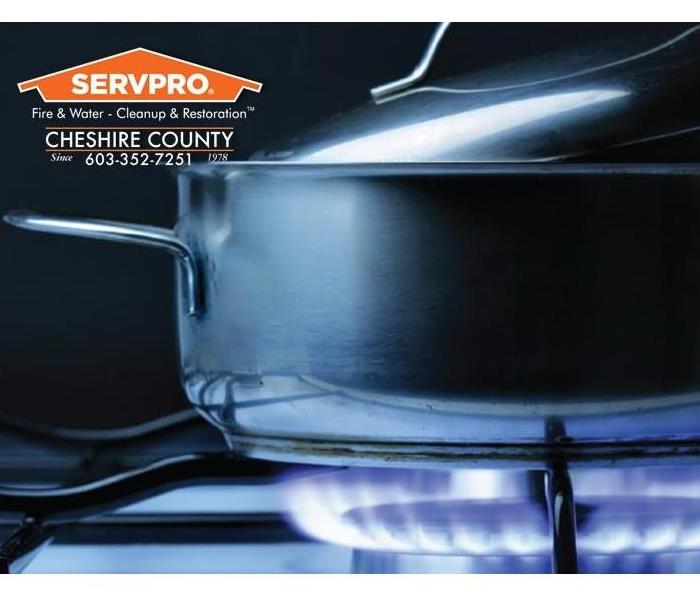 Cooking and preparing your favorite meal can be relaxing and fun, but safety should be considered when doing so.
Cooking and preparing your favorite meal can be relaxing and fun, but safety should be considered when doing so.
Earlier this month, "National Burn Awareness Week" was recognized which serves as an opportunity to for organizations to mobilize burn, fire, and life safety educators to unite in sharing common burn awareness and prevention information. The theme for 2022 is Burning Issues in the Kitchen. Cooking is the number one cause of residential fires in the United States. The American Burn Association reports 47% of all home fires are caused by cooking. Here are some tips to keep you and your family safe while cooking in the kitchen.
- The Best time to cook is when you are wide awake.
- Always wipe the stove, oven, and exhaust fan after cooking to prevent grease buildup.
- Turn pot or pan handles toward the back of the stove.
- When heating food in the microwave, use microwave-safe cookware that allows steam to escape.
- When frying, use a pan, lid, or splash guard to prevent grease splatter.
- If you are simmering, baking, roasting, or boiling food, check it regularly. Remain in the home while cooking and use a timer to remind you to check your food.
Remember to be safe, be alert, and keep safety on the forefront when cooking in the kitchen.
Furnace Puffbacks: Soot Cleaning
2/22/2022 (Permalink)
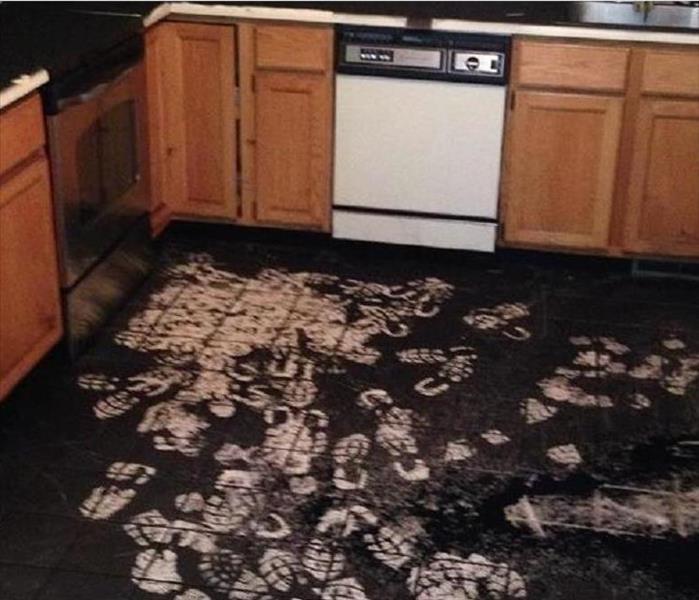 Cleaning and removal of oily soot, if not performed properly, can result in damaging household surfaces and belongings.
Cleaning and removal of oily soot, if not performed properly, can result in damaging household surfaces and belongings.
SERVPRO of Cheshire County handles cleanup and restoration following a wide variety of disasters, mishaps, and events within a property. Fire, water, biohazard, sewage, and mold to name a few. One type of occurrence you may not be familiar with is what is referred to as a puffback.
A puffback occurs within an oil-fired heating system, (gas-fire systems as well but more commonly oil) when the burner does not properly ignite, and results in a minor explosion within the combustion chamber of the furnace. This leads to the oily smokey residue, or soot, to pass through the home's heating system and affected the building's interior. The damage can vary in severeness from a light discharge to a heavy, thick coating of soot on ceilings, walls, floors, and belongings.
It is important to have your heating source serviced yearly by a HVAC professional. With regular maintenance and attention, puffbacks can be avoided.
Improper cleaning of soot and oily residue can result in staining and may cause damage to household belongings and materials. In the event you experience a puffback in your home or commercial property, be sure to contact the cleaning and restoration experts at SERVPRO of Cheshire County. We're here to help!
Fire Damage: What to do Until Help Arrives
1/22/2022 (Permalink)
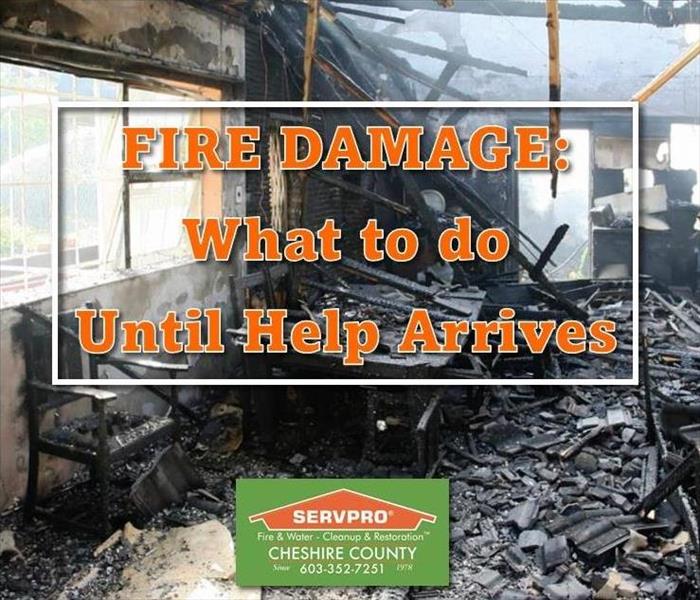 The professionals at SERVPRO of Cheshire County are available 24/7 to assist with your fire or smoke damage emergency.
The professionals at SERVPRO of Cheshire County are available 24/7 to assist with your fire or smoke damage emergency.
There is no denying that experiencing a fire to your home or commercial property is traumatic, harrowing, and stressful. The event is anything but pleasant. The emergency cleanup and restoration professionals at SERVPRO of Cheshire County understand the delicate nature of this type of situation and will carefully walk you through the step-by-step restoration process. From the initial inspection to the detailed cleaning and deodorization, SERVPRO aims to limit the stress and anxiety you the property owner may be experiencing following the event.
Before SERVPRO of Cheshire County arrives on site, here are a few steps to take to help limit secondary damage of your property and belongings.
- Limit movement in the home to prevent soot from spreading and additional damage from occurring.
- Place clean towels or old linens on rugs in high traffic areas and on upholstered furniture.
- Place wood blocks or aluminum foil under furniture with wooden legs.
- Do not attempt to wash any walls or painted surfaces.
- Do not shampoo carpet or upholstery.
- Do not clean electrical equipment.
- Tape double layers of cheesecloth over air registers to stop soot particles from getting in or out of your HVAC system.
- Wipe soot from chrome on kitchen or bathroom faucets, trim, and appliances. Apply a light coating of lubricant to protect these items.
- Keep your hands clean as much as possible. Soot on hands can further soil upholstery, walls, and woodwork.
SERVPRO of Cheshire County is available 24/7 to assist with your emergency. We're here to make fire and smoke damage "Like it never even happened."
Fire Damage Prevention Tips
12/20/2021 (Permalink)
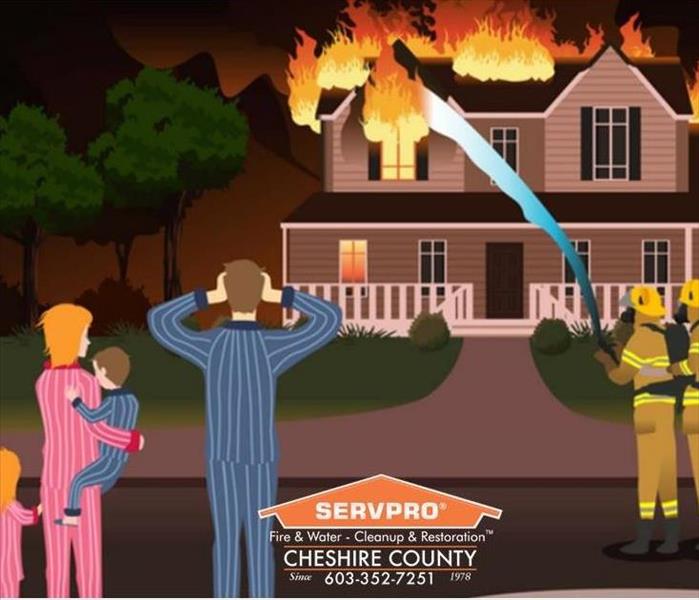 SERVPRO of Cheshire County is available 24/7 to assist with cleaning and restoration following a fire or smoke damage.
SERVPRO of Cheshire County is available 24/7 to assist with cleaning and restoration following a fire or smoke damage.
It seems like only yesterday we were enjoying backyard BBQs, pool parties and enjoying warm sunny weather. Well, don't look now but we're approaching the final two weeks of the year and cold temps and heavy snowfall have arrived. Just like that, it's home heating season again and what better time than now to review important home heating fire prevention tips. It's never a bad time for a refresher about fire prevention.
- Have your furnace inspected by an HVAC professional.
- Have your chimney inspected and/or cleaned by a professional. If your fireplace is used six times a year or more, be sure to have the chimney cleaned at least once a year.
- Use a fireplace diffusion screen when in use.
- Be cautious when using a space heater. Use one with an emergency cut-off if it is accidentally tipped over. Never leave a space heater unattended and use on a flat surface that is not flammable.
- Have your dryer vent cleaned out every year.
- Keep potentially flammable items away from your home's boiler.
You can never be too careful when it comes to fire prevention and safety. In the event you or your family requires cleanup and restoration from a fire, contact the professionals at SERVPRO of Cheshire County. We'll help make fire and smoke damage "Like it never even happened."
Deep Fried Turkey Safety Tips
11/24/2021 (Permalink)
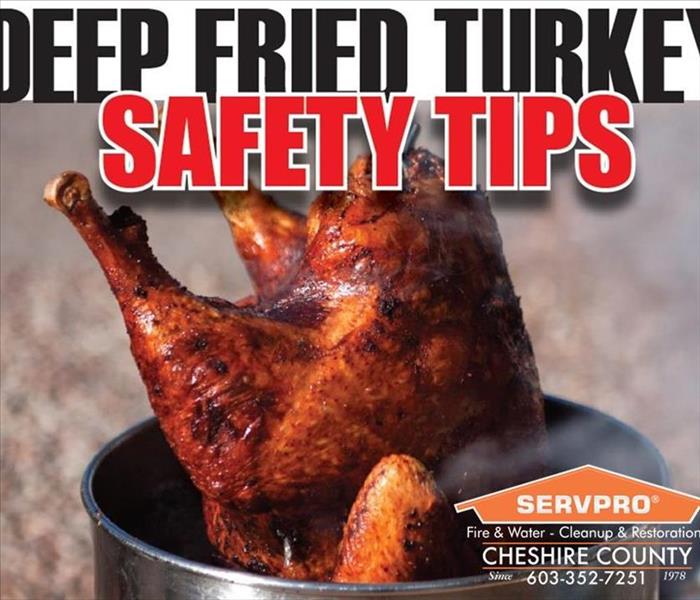 Plan and be safe when preparing your deep-fried turkey. This will ensure you, your family, and friends have an enjoyable and delicious turkey!
Plan and be safe when preparing your deep-fried turkey. This will ensure you, your family, and friends have an enjoyable and delicious turkey!
Deep fried turkey has become a wide spread delicacy this time of year. Many famous chefs have stated that deep frying a turkey is a quick method of cooking that provides a crispy and flavorful bird.
However, deep frying a turkey is a more dangerous way of cooking. Having gallons of hot cooking oil over an open flame can be a recipe for disaster. The National Fire Protection Association discourages the use of outdoor, gas-fueled deep fryers due to their risk of injury and damage to your property.
If you still choose to use a deep fryer for your holiday feast, please follow the following safety measures provided by the National Fire Protection Agency:
- Set up your deep fryer on a flat surface, more than 10 feet away from any structures.
- Make sure your turkey is completely thawed and dry before slowly placing it in the hot oil.
- Do not leave the fryer unattended. Continuously monitor the temperature of the oil.
- Protect yourself. Lids and handles can become very hot and cause burns. Wear protective equipment.
- Always have a fire extinguisher ready at all times. A multipurpose, dry-powder unit is best. Be sure to keep children and pets away from the area while cooking.
Keep these helpful tips in mind while preparing your deep-fried turkey. Be safe and most of all, enjoy your turkey and have a great Thanksgiving!
Industry Leading Training: Fire & Smoke Restoration
10/25/2021 (Permalink)
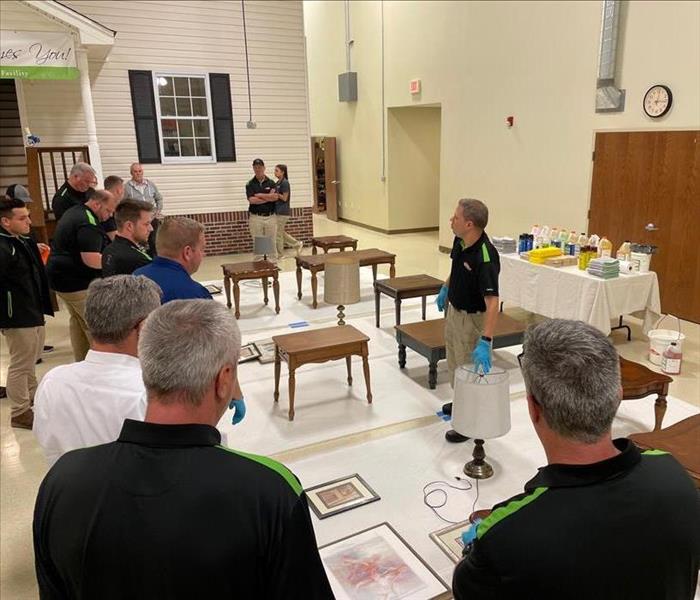 From structure restoration to furniture and content cleaning, to deodorization, SERVPRO of Cheshire County pros are ready to assist you.
From structure restoration to furniture and content cleaning, to deodorization, SERVPRO of Cheshire County pros are ready to assist you.
Having a fire or smoke damage at your residence or business can be a traumatic experience. Your home or commercial property is one of your most valuable possessions and losing it or having it damaged can be overwhelming.
The professionals at SERVPRO of Cheshire County understands a fire can cause and are ready to assist in getting you back into your property as soon as possible. We can do so by having a team that is thoroughly trained and experienced. Our staff receives the most extensive, industry-approved training available both in the classroom and hands-on. Our technicians, project managers and even our owners obtain certifications for fire and smoke restoration through the Institute of Inspection Cleaning & Restoration Certification (IICRC). They are taught the ins & outs of fire and smoke restoration from structure cleaning, hard content cleaning, soft goods restoration, and the science of deodorization.
You can be sure when SERVPRO of Cheshire County arrives to begin restoration services on-site at your damaged property, you will be assisted by a team of highly skilled, trained, and experienced professionals. We're here to help make your disaster "Like it never even happened."
Chimney Fire Prevention Tips
9/7/2021 (Permalink)
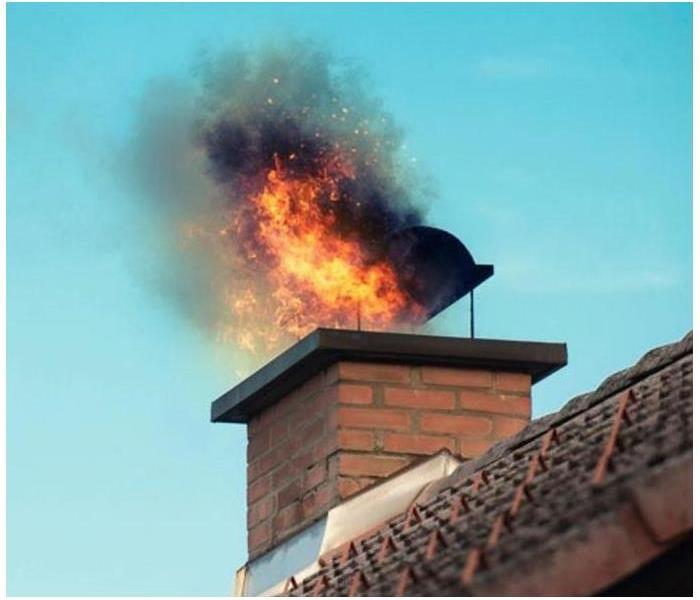 Annual chimney inspection by a CSIA-certified chimney professional is a great step to take in identifying & repairing potential chimney fire hazards.
Annual chimney inspection by a CSIA-certified chimney professional is a great step to take in identifying & repairing potential chimney fire hazards.
It may be hard to believe, but with the Labor Day behind us and the unofficial end to Summer, heating season is not far off. Now is a great time to begin preparing for the colder months and making sure your home or property are safe and ready for heating season. One of the most common causes of fires in a home comes from the chimney. Thousands of chimney fires take place each year. The main reason a chimney fire occurs is due to flames in the lower section of the chimney migrating to the upper part of the chimney, causing the masonry or metal chimney walls to warp, melt or crack. Here are some examples of how you can help to prevent a chimney fire from occurring:
- Minimizing creosote build-up within the chimney. Only burn seasoned hardwood that has been dried for six months.
- Make sure your flue liner is insulated. This will help to prevent flue temperatures from getting too cool which could ultimately encourage fire by-products to condense and form creosote.
- Schedule an annual chimney inspection. Ideally, seek out a Chimney Safety Institute of America-certified chimney professional to inspect your chimney, fireplace or woodstove to inspect and locate any potential damage in these areas that could lead to chimney fires.
- Install a chimney cap. A cap on the crown of the outside opening of the chimney can help to prevent leaves, debris and even critters out of the chimney which can fuel a chimney fire when coming in contact with loose embers from a fire. A cap also helps to keep out rain which, over time, can corrode the chimney.
For more facts about chimney fires, and how you can locate an CSIA-certified chimney inspection professional, check out https://www.csia.org/.
Common Causes of Household Fires
8/17/2021 (Permalink)
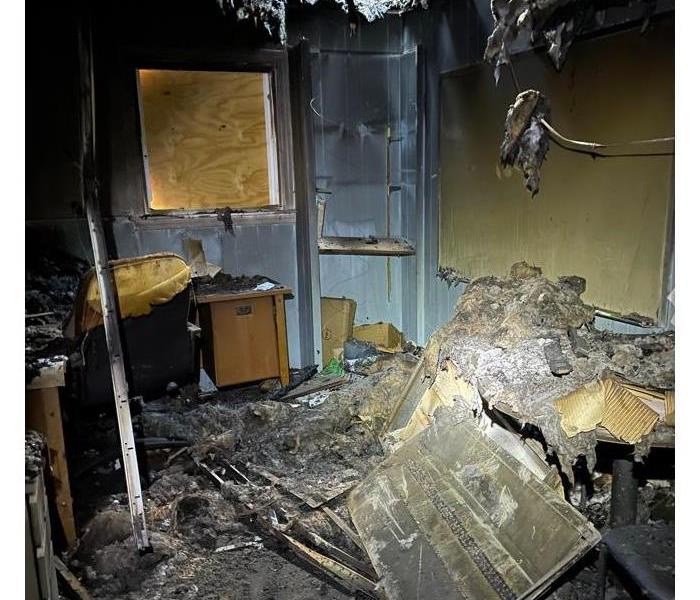 SERVPRO of Cheshire County professionals are available 24/7 to assist with fire and smoke damage restoration.
SERVPRO of Cheshire County professionals are available 24/7 to assist with fire and smoke damage restoration.
Experiencing a fire in your home or commercial property can be a significantly traumatic event. As a local provider of fire & smoke restoration services, we at SERVPRO of Cheshire County have assisted in the cleanup of fire damage resulting from a variety of different causes. Here are a few of the leading causes of house fires according to the National Fire Protection Association:
1. Cooking Fires-Specifically, unattended cooking. Be sure to check the items you're cooking regularly, keep any items that could catch fire away from the stove top or open flame, and stay alert: if you're sleep or have consumed alcohol, do not use stove or stove top.
2. Heating Related Fires- Be sure to check out our other blogs regarding home heating safety. Half of home heating fires take place during December, January, and February.
3. Electrical Fires- May is National Electrical Safety Month which is meant to raise awareness of potential home electrical hazards and the importance of electrical safety as well as the safety of electrical workers.
4. Smoking Related Fires- In 2014, it was reported that smoking materials such as cigarettes, cigars, and pipes caused over 17,000 home structure fires in the United States.
5. Candle Related Fires- There were reportedly over 7,600 home related structure fires in the U.S. between 2014-2018. On average, 21 home candle fires are reported each day.
For more information regarding causes and prevention of home structure fires, be sure to visit the website of the National Fire Prevention Association.
For 24/7 assistance with fire or smoke damage restoration, be sure to contact the professionals at SERVPRO of Cheshire County. Making fire and smoke damage "Like it never even happened."
Fire Restoration: Removal of Damaged Materials
4/1/2021 (Permalink)
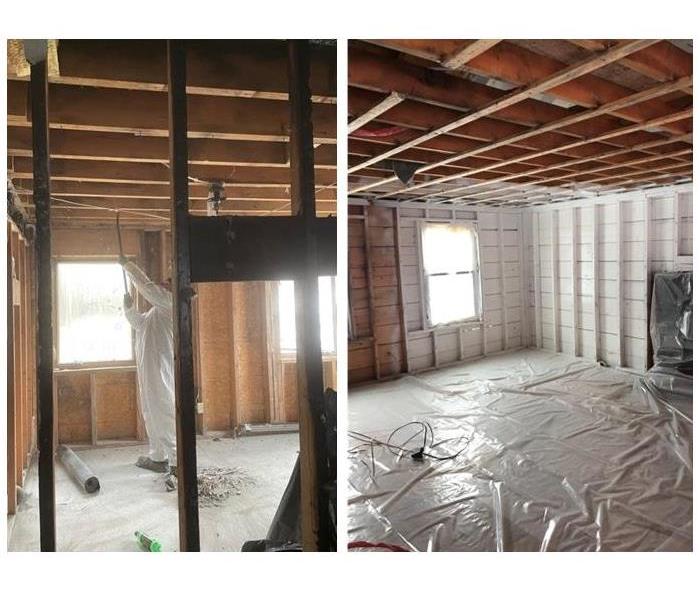 Once heavily, unsalvageable materials are removed, a coat of paint is often required to encapsulate and eliminate lingering smoke odor.
Once heavily, unsalvageable materials are removed, a coat of paint is often required to encapsulate and eliminate lingering smoke odor.
Experiencing a fire in a home or commercial property is a traumatic event and can be quite overwhelming. No matter the level of damage sustained by the building, there are many steps during the process of returning the property to its pre loss condition. The professionals at SERVPRO of Cheshire County are experts in the process and will assist the property owner through it step by step.
Occasionally smoke is the only damage left in the wake of a fire but in many situations, the damage is more severe and requires further action be taken. Windows may need to be boarded, roofs covered, and heavily damaged building materials that cannot be salvaged may need to be removed. These materials include drywall, insulation, cabinetry, and flooring. SERVPRO of Cheshire County will communicate with the property owner during the inspection and mitigation phases of the project as to which areas can be cleaned, deodorized, and saved, and which areas will be removed and discarded. From there the damaged materials are removed, followed by a thorough cleaning, deodorization and in some cases painted to eliminate lingering odors.
This is only one phase of the mitigation process following a fire, but you can be sure the professionals at SERVPRO of Cheshire County will be there to navigate you through from start to finish.
Home Heating Safety: Space Heaters
2/8/2021 (Permalink)
For the next blog in our series regarding Home Heating Safety, we will now outline safety tips for Space Heaters. As a reminder: the U.S. Fire Administration documents that heating is the second leading cause of fires in homes. Here are a few pointers when adding heat to your home through the use of space heaters:
- Make sure your heater has been tested by a recognized testing laboratory.
- Your space heater should have an automatic shut off in the event it tips over.
- Be sure to place space heaters on a flat, sturdy surface.
- Do not leave heaters turned on when leaving or going to sleep.
- Do not leave any items that could potentially burn near the heater. Make sure nothing is within 3 feet of the heater.
- Do not plug anything else into the same circuit as the one used to power the space heater. Overheating may occur.
- Do not plug the space heater into a power strip or extension cord. Plug heater directly into an outlet.
Be sure to utilize these safety tips whenever using an electric space heater. For more info, be sure to check out the U.S. Fire Administration online!
Home Heating Safety: Fireplaces & Wood Stoves
2/5/2021 (Permalink)
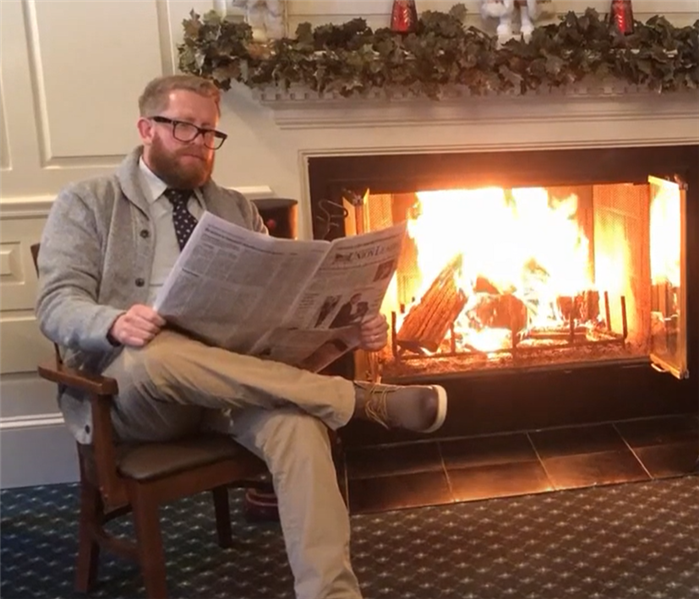 Safety should be a priority when heating your home with a wood stove or fireplace.
Safety should be a priority when heating your home with a wood stove or fireplace.
Winter is here and along with snow and ice, it means heating season for us New Englanders. There are many options but whatever your method for heating your home you should always aim to heat safely. According to the U.S. Fire Administration, heating is the second leading cause of fires in homes. Today we will look at safely heating with a Fireplace or Wood Stove Here are a few points to consider:
- Keep anything that can burn at least 3 feet away.
- Always put the fire out before going to sleep or leaving the home.
- Do not burn paper in your fireplace or wood stove.
- Be sure to have your chimney inspected and cleaned each year by a professional.
- Ashes should be put in a metal container that has a lid. Additionally, place the container outside and away from the building no less than 10 feet.
Follow these steps to be sure you safely heating your home with a wood stove or fireplace. At SERVPRO of Cheshire County, we're always here to help!
Smoke Restoration: Content Cleaning
1/11/2021 (Permalink)
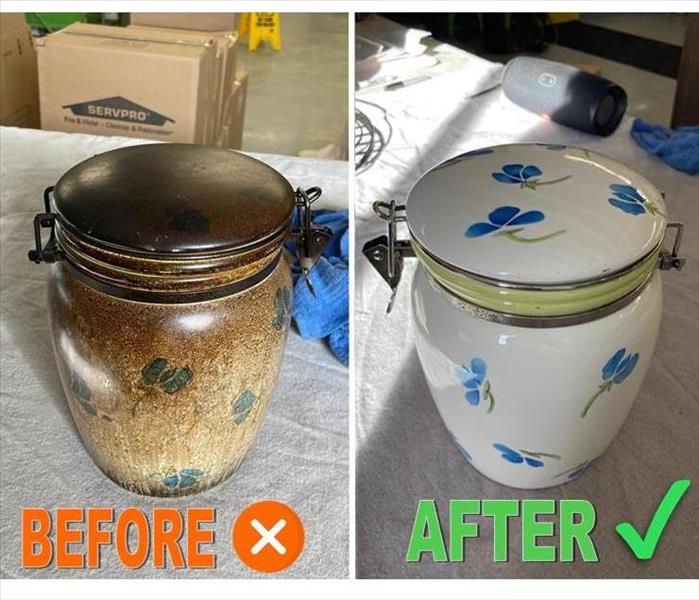 Smoke restoration of personal contents is an important and meticulous part of the fire restoration process.
Smoke restoration of personal contents is an important and meticulous part of the fire restoration process.
Following a fire, mitigating smoke damage can be one of the biggest challenges during a restoration project within a residential or commercial property. Not only does the structure of the building require cleaning, but restoring building contents is a huge part of the cleaning and deodorizing process. Everything within the property affected by smoke or soot is carefully and meticulously cleaned by SERVPRO of Cheshire County professionals. Furniture, rugs, books, cabinet contents, wall hangings and much more are all cleaned and deodorized during a fire or smoke restoration project.
Restoring contents is often times less costly than replacing or refinishing them. Plus, many belongings are so much more than simply "contents" to property owners and hold considerable sentimental value. We at SERVPRO of Cheshire County always aim to restore rather than replace whenever possible.
Our industry-certified technicians are able to determine the best method of cleaning for contents of all varieties, materials and finishes. All of our cleaning products are developed and created by SERVPRO. For more information SERVPRO contents cleaning please contact us anytime!
Do's & Dont's: Fire Prevention During the Holidays
10/9/2020 (Permalink)
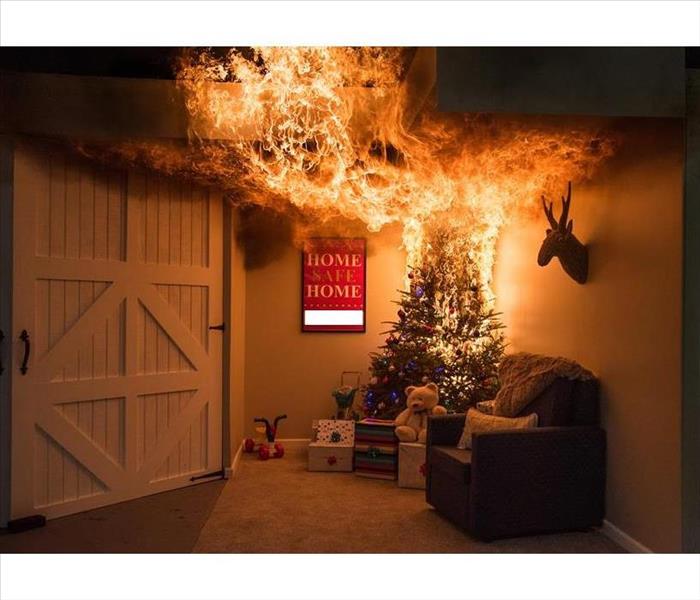 Take extra precautions during the holidays in order to prevent fires in your home!
Take extra precautions during the holidays in order to prevent fires in your home!
The holiday season is an exciting time to gather with family and friends, decorate the home, share meals, and celebrate. Throughout the festivities, you need to take extra precautions to prevent accidents. The winter months are the most common months for home fires and fire restoration services. To keep your family safe and the holidays merry, follow the fire prevention tips below.
Do:
Use flameless candles.
Open flames from candles can be especially dangerous with children and pets running around the house. Consider switching to flameless LED candles, which flicker just like real candles without posing a fire risk. If you use real candles, keep them far out of reach from kids and animals and never leave them burning unsupervised.
Keep an eye on your cooking.
According to the U.S. Fire Administration, more than 50% of all residential fires were started while cooking. When families are preparing large amounts of food while entertaining guests, it’s easy to get distracted and neglect the oven or stove. Stay in the kitchen when cooking and continuously check on your food.
Test cords and lights before use.
Always inspect and test holiday lights before hanging them up, and throw out any sets with damaged cords, loose connections, or cracked bulbs. Frayed and exposed wires can easily cause an electrical fire. Never leave decorative lighting on unattended—unplug all lights before leaving the house and going to bed.
Don’t:
Overload your electrical circuits.
Too many electronics, appliances, and decorations plugged in can overload your circuits and cause sparks. Limit your use of extension cords and unplug any item that isn’t in use.
Avoid using outlets in rooms that already have many large appliances, such as the kitchen. Invest in LED lighting to cut back on your electricity usage.
Let Christmas trees dry out.
Dry and brittle trees are more likely to ignite and burn quickly. Watering Christmas trees every day significantly reduces their risk of catching fire. As soon as the holidays end or your tree dries out, dispose of it properly.
Place plants near heat sources.
It may be tempting to fill the space next to a heater or in front of the fireplace with plants, but this can create a serious fire hazard. All plants and Christmas trees should be kept several feet away from any heat sources. This includes light bulbs, radiators, space heaters, and floor and wall registers.
4 Tips to Prevent Restaurant Kitchen Fires
9/9/2020 (Permalink)
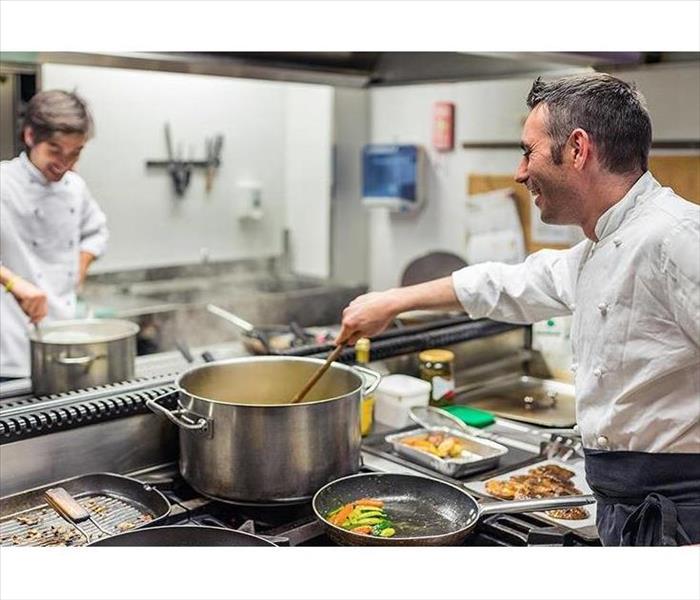 There are many ways to avoid a kitchen fire in your restaurant, read up on a few of them here.
There are many ways to avoid a kitchen fire in your restaurant, read up on a few of them here.
Your restaurant’s kitchen is the most significant part of the business, and it creates several fire hazards. However, to avoid fire damage repair, you can take several measures that will reduce the risk that a fire will occur. Below are several strategies to employ in your kitchen.
What Tasks Can Help You Avoid Kitchen Fires?
1. Maintain Electrical Equipment
Often, the kitchen has many different electrical appliances, such as blenders, toasters, and ovens. However, the wiring and cords can wear down over time, increasing the risk of a spark that creates a fire hazard. You should inspect all electrical equipment regularly for damage, paying close attention to the cords and outlets.
Also, schedule yearly professional maintenance for all kitchen appliances to check for damage that you cannot easily see. After closing the restaurant, unplug all appliances to prevent a fuse shortage at night that could cause a fire.
2. Clean Grease
While grease is unavoidable in most commercial kitchens, you should manage it carefully to avoid issues that require fire damage repair. Grease is extremely flammable, and it can splatter around the area, allowing flames to spread.
Regularly clean all surface areas that accumulate grease, including the counter tops, walls, ranges, grills, hood systems, and floors. Then, dispose of the residue away from the kitchen.
3. Train Staff
Make sure your entire staff, from cooks to servers, knows how to properly identify fire hazards. They should understand the location of breaker switches, as well as how to operate them. Then, create clear guidelines about the process and frequency of cleaning grease, and how to keep flammable materials away from the oven and stove.
4. Never Leave Food Unattended
When cooking food, someone should always be monitoring it. Anything cooking over an open flame poses a significant fire hazard, as grease or oil can spill over and catch on fire quickly. Food that burns in the oven or microwave can also create a dangerous issue. If everyone on your staff must leave the kitchen for some reason, turn of all burners and heat sources while they’re away.
3 Ways to Prevent Pet-Related Fires
8/18/2020 (Permalink)
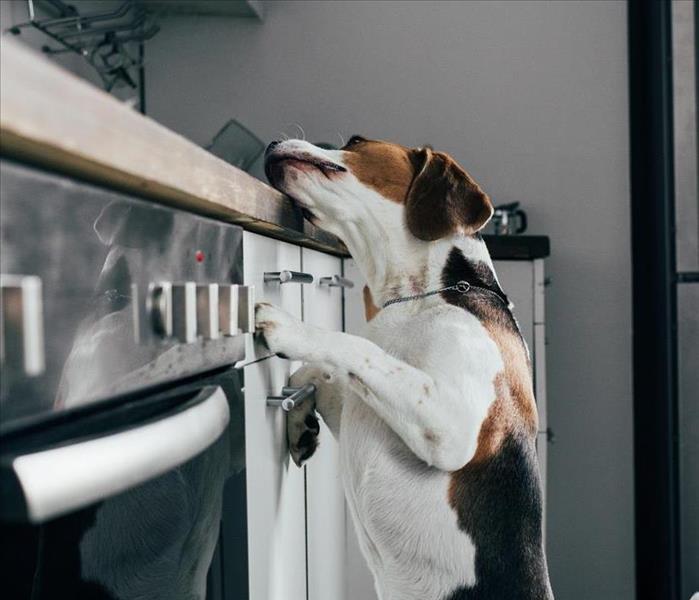 Dogs can sometimes jump up on the stove and turn the knobs by accident.
Dogs can sometimes jump up on the stove and turn the knobs by accident.
You love your pets and naturally want to protect them from harm. Unfortunately, pets can sometimes cause fires in the home if a few simple precautions aren’t taken. While fire damage repair can help restore your home, it’s best to prevent fires from breaking out in the first place. Here are a few ways you can protect the health of your pets and your family.
What You Need to Know About Pet-Related Fires
1. Be Careful With Candles
A wagging tail is a sign of happiness in dogs, but it can also be hazardous around open flames. Pet owners are encouraged to forgo conventional candles for flameless ones. If you do use candles, place them somewhere your pets can’t reach them.
2. Safeguard Your Stove
Larger dogs sometimes jump on stoves and inadvertently turn the knobs with their paws. This could result in pets burning themselves, but it can also lead to a fire if there are flammable materials nearby. Along with removing papers, cardboard, and fabrics from around the stove, you should also consider removing the knobs on the stove when away. You can also install locks on the knobs to prevent your dog from inadvertently turning them.
3. Use Ceramic or Stainless Steel Water Dishes Outside
While it may seem unlikely, using a glass bowl on a wooden deck for your dog’s drinking water can also be a fire hazard. When the sun’s rays are filtered through water and glass onto the wood beneath, a fire can break out — similar to what happens with a magnifying glass on a sunny day. If a fire occurs on your deck when you're not around, it can easily spread to the home and cause significant destruction.
Is Your Home Fire Safe?
4/17/2020 (Permalink)
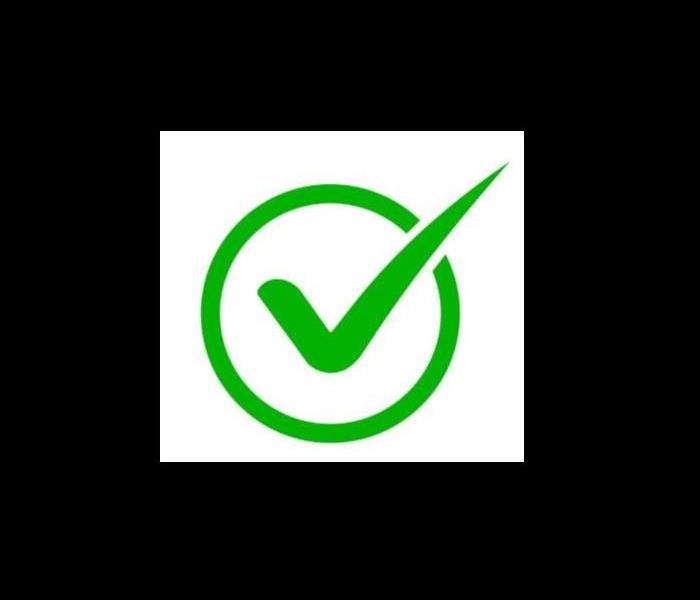 Is your home fire safe?
Is your home fire safe?
The American Red Cross is a great resource to help ensure you and your home are safe. Below is their Home Fire Safety Checklist. Take a moment to read through the list and see if there is anything that could be done differently at your home to make it safer.
- “Keep an eye on what you fry.” Whenever you are cooking or using an open flame it is important to never leave it unattended.
- “3 feet from the heat” is the golden rule for heating safely. Anything that could catch fire, such as furniture, towels and curtains, should be kept at least 3 feet away from any heat source.
- Never smoke in bed.
- Plug appliances, both large and small, directly into wall outlets.
- Keep matches, lighters and fire starters locked away from children who tend to be curious and may not understand the risks.
- Regularly check that your smoke alarms are functioning properly. It is recommended to swap out the batteries every year (unless the alarm has a long-life battery). Also, it is recommended to replace smoke detectors about every ten years.
- Different types of smoke alarms detect fire in different ways. Experts recommend utilizing both types in your home.
- Having a sprinkler system working in combination with smoke alarms is another safety measure that can help save lives.
- Have a home fire escape plan and practice at least twice a year with all your family members.
For more information, visit the American Red Cross’s website: redcross.org
If you ever experience a fire at you home or business, call us anytime at (800) 352-7251.
The Importance of Deodorization
4/2/2020 (Permalink)
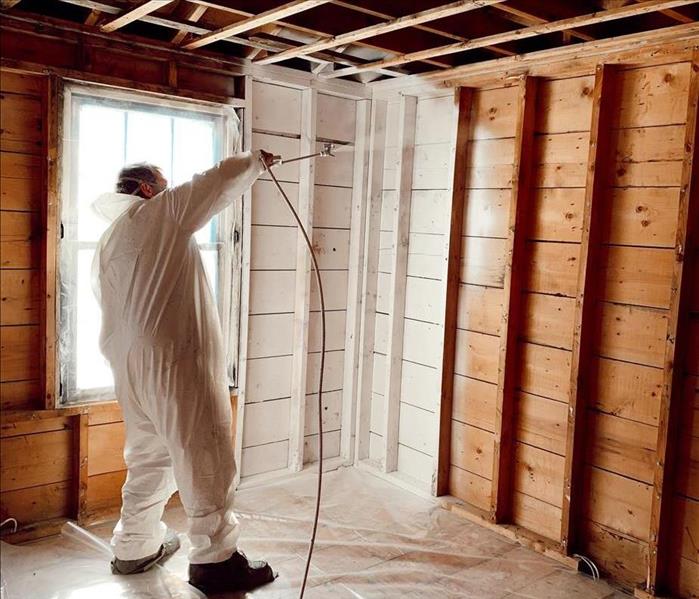 A SERVPRO technician sprays a smoke sealant after cleaning & deodorizing a home after fire damage.
A SERVPRO technician sprays a smoke sealant after cleaning & deodorizing a home after fire damage.
In your home or business, fire, smoke, or even soot damage can leave you with unpleasant and potentially permanent problems. Smoke produced during a fire can travel throughout the structure leaving deposits and even odors on various surfaces & hard-to-reach areas. It is crucial that professional action is taken quickly as these residues can cause permanent damage. At SERVPRO, our technicians are certified by the Institute of Inspection, Cleaning, and Restoration, and can rid your home or business of the odors left by fire or smoke damage. Instead of covering up the odors, technicians use SERVPRO’s own line of cleaning products to remove the source and prevent the odor from returning. Odor from fire damage is not the only stubborn odor that SERVPRO can take care of, water and mold damage can also cause permanent problems if not addressed properly.
What To Do After A Fire
- Limit movement in the home to prevent soot particles from being embedded into upholstery and carpets.
- Keep hands clean so as not to further soil upholstery, walls and woodwork.
- Place clean towels or old linens on rugs, upholstery and carpet traffic areas.
- If electricity is off, empty freezer and refrigerator and prop doors open.
- Clean and protect chrome with light coating of petroleum jelly or oil.
- Wash houseplants on both sides of leaves.
- Change HVAC filter.
- Tape double layers of cheesecloth over air registers.
What NOT To Do After A Fire
- Don't attempt to wash any walls or painted surfaces or shampoo carpet or upholstery without contacting your SERVPRO Franchise Professional.
- Don't attempt to clean any electrical appliances that may have been close to fire, heat or water without consulting an authorized repair service.
- Don't use any canned or packaged food or beverages that may have been stored near the fire, heat or water.
- Don't turn on ceiling fixtures if ceiling is wet. The wiring may be damaged.
- Don't send garments to an ordinary dry cleaner. Improper cleaning may set smoke odor.
3 Common Causes of Electrical Fires
2/7/2020 (Permalink)
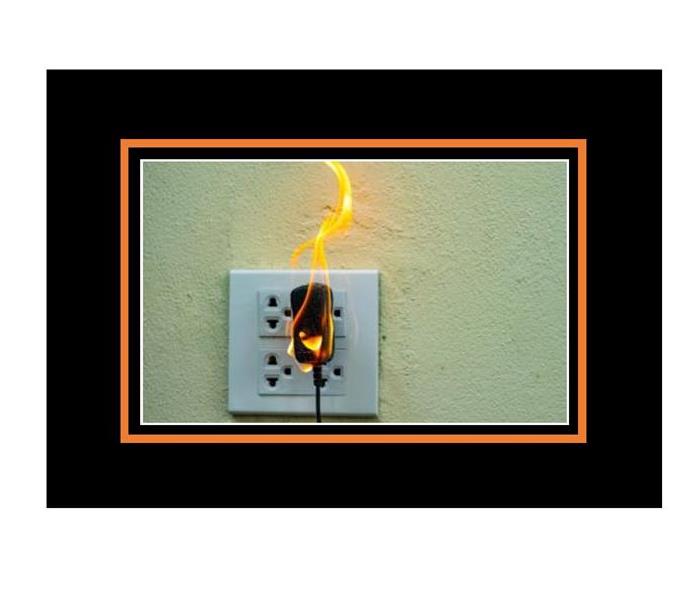 From biohazard and water cleanup to mold removal and fire damage restoration, we are a trusted leader in disaster support.
From biohazard and water cleanup to mold removal and fire damage restoration, we are a trusted leader in disaster support.
Electrical malfunctions are the second leading cause of house fires in the United States. Since these types of fires can originate in any of the major components of a home's electrical systems, understanding their common causes and learning how to prevent them is crucial. Keep your family and home safe and avoid the need for fire damage restoration services with this list of common electrical fire causes.
What Can Cause Electrical Fires?
- Faulty Wiring
Wiring issues often occur in older homes that cannot accommodate the electrical load of a modern household. This results in an overtaxing of the wires and connections, which increases the potential for fire. Homes more than 20 years old may need updates made to their electrical system. Signs to look out for include frequently tripping circuits, flickering lights, or outlets that emit a buzzing sound. Wiring upgrades should only be performed by a licensed electrician.
- The Wrong Lightbulbs
Using a lightbulb with a higher wattage than what is specified on the fixture will cause overheating. The excess heat damages the fixture and can melt the bulb socket, either of which could lead to a fire. Go through your home and make sure that all light fixtures contain bulbs with the correct wattage. When in doubt, check the owner's manual for the fixture for the exact requirements.
- Extension & Power Cord Issues
Many extension cords are not equipped to handle the amount of energy needed for the appliances they power, leading to overheating and fires. Power cords are subject to frays, cracks, and other wear and tear that raise the risk of fires. To use fewer extension cords, have an electrician install additional outlets.
If you've experienced an electrical fire and need fire damage restoration, trust SERVPRO of Cheshire County. Since 1978, we have been providing disaster recovery services throughout the Westmoreland, NH area. From biohazard and water cleanup to mold removal and fire damage restoration, we are a trusted leader in disaster support. Call us at (603) 352-7251 to request an estimate.
The Do's & Don'ts of Handling Grease Fires
1/14/2020 (Permalink)
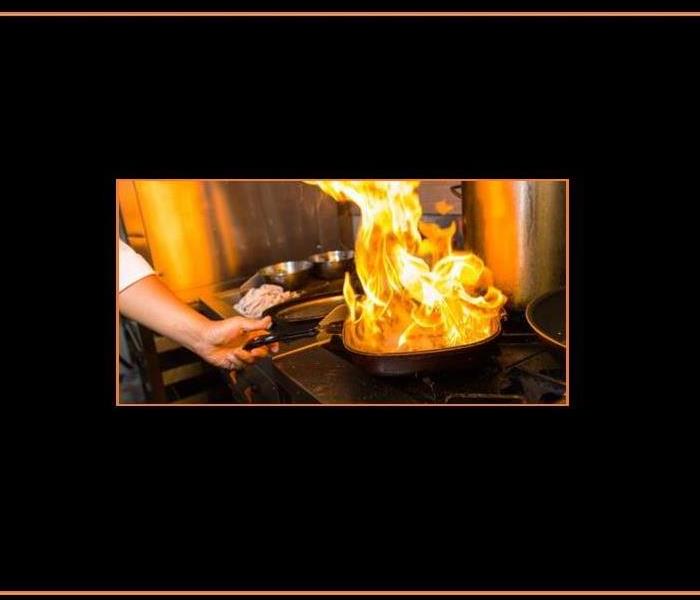 Our Team Can Be Reached Anytime In The Event Of A Fire Damage By Calling: (800) 352-7251
Our Team Can Be Reached Anytime In The Event Of A Fire Damage By Calling: (800) 352-7251
It can be fun to experiment with cooking in the home kitchen, but some ingredients require special care to be used safely, like cooking oil. When using oil, watch the temperature, because when it overheats, it starts to boil and smoke before catching on fire. If you see flames, it’s natural to panic. To take control of the situation quickly and avoid the need for extensive fire damage repair, below are tips on what to do and what not to do when you have a grease fire.
Do:
Turn off the heat.
Once a fire breaks out, you might be tempted to remove the smoky pan from the stove burner. Fight the urge, as you could splash burning oil on yourself or other surfaces. The droplets are like embers, potentially igniting anything they land on. To prevent the fire from spreading, leave the pot where it is and turn off the burner.
Keep an extinguisher in the kitchen.
As a precaution, you should always have a working fire extinguisher in an easy-to-reach area of the kitchen. After you turn off the stove burner, pull the pin on the extinguisher and point the nozzle at the fire’s base before pressing the trigger. The dry chemicals released will put out the flames.
Don’t:
Use water on flames.
Unlike a regular fire, trying to douse grease fires with water could cause the flames to spread. That’s because pouring water on the oil could cause it to splash to other areas. The high temperature of burning grease also causes the water to vaporize into harmful steam.
Open doors and windows until the fire is out.
To clear the smoke, you might want to open doors and windows. Don’t do this until the fire is completely out. Otherwise, the oxygen in the fresh air coming in could fuel the flames, resulting in the need for more extensive fire damage repair.
If you need fire damage repair after a kitchen mishap, electrical problem, or other incident, contact the disaster recovery specialists at SERVPRO of Cheshire County. In the event of a plumbing problem or flood, our team can also use our four decades of experience to provide water clean-up services. To reach us anytime, call (800) 352-7251.
October is Fire Prevention Month
10/22/2019 (Permalink)
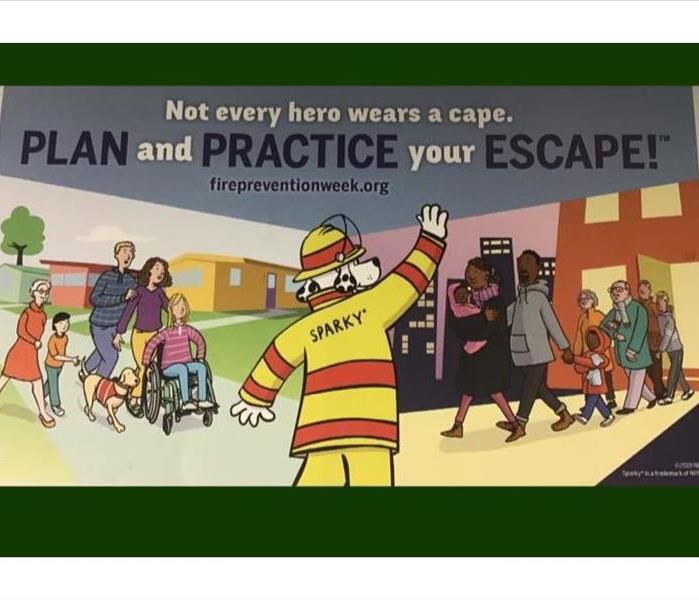 The NFPA sets aside a designated week in October every year to focus on fire prevention. Set aside time with your family to do the same!
The NFPA sets aside a designated week in October every year to focus on fire prevention. Set aside time with your family to do the same!
Did you know that October is Fire Prevention Month? As the days get shorter and colder, thermostats are being turned up and fires are crackling in fireplaces it makes sense that October would be the month for revisiting fire safe practices. Below are a few things to keep in mind not just during Fire Prevention Month but throughout the year:
- Have you checked on your smoke detectors? Smoke detectors in your home should be tested at least once a year. Be sure that the batteries and the detectors are still working properly!
- Do you have an escape plan? Fire escape plans can be the difference between life and death in a fire emergency. Even if you feel you know the escape plan very well it’s a good idea to revisit the plan at least once a year. Practicing drills with your family is also a good idea just in case!
- Unsafe cooking practices can ruin your holidays. Did you know that home cooking fires are four times more likely on Thanksgiving than on a typical day? Cooking fires are one of the leading causes of home fires especially around the holidays. Practicing safe kitchen habits is important in keeping you and your home safe!
- Remember that every second counts in a fire emergency. According to the National Fire Protection Association (NFPA), once the fire alarm goes off, you will likely have less than a minute or two to escape the home safely. It may be tempting to save prized possessions but your number one priority in a fire emergency needs to be getting out quickly and safely.
- Stop, Drop & Roll. Remember learning this in grade school? It’s not just for kids. If you or a someone else catch fire it is important to remember those three words.
For more tips and fire safe practices, visit: firepreventionweek.org
If your home or business are damaged in a fire, we can help.
(800) 352-7251
Fire Safety For Your Kitchen
9/13/2019 (Permalink)
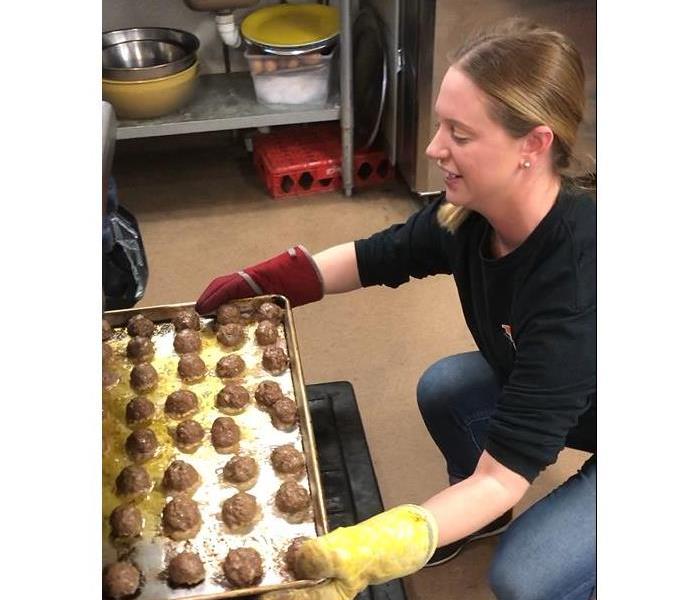 Cooking can be fun if done safely!
Cooking can be fun if done safely!
According to the National Fire Protection Association, cooking is the number one cause of house fires with unattended cooking being associated with the majority of these fires. Here are some tips from the National Fire Protection Association to follow in your kitchen:
- Keep a fire extinguisher on hand and make sure you know how to use one. It’s also important to use the correct type of extinguisher for the fire you’re fighting.
- Use caution and stay alert! If you are sick, intoxicated or sleep deprived, it’s safest to avoid using the oven or stovetop until you feel healthier.
- Keep flammable items like plastic and wooden utensils, curtains, paper towels, food packaging and oven mitts away from your stovetop.
- Use a timer to remind you to check on your food regularly. It is important to keep an eye on what you’re cooking, especially if it’s being cooked at high temperatures (broiling, frying, boiling, etc…).
- Don’t leave hot oil unattended. When you are frying food, it’s important to always stay put and keep an eye on it as hot frying oil can become a dangerous situation rapidly. Gradually heat the oil to the temperature needed for sautéing or frying. If the oil becomes too hot, lower the heat or carefully remove the oil from heat immediately. Wisps of smoke are one sign that the temperature of the oil is too high. Keeping a thermometer specifically designed for frying can help you keep the oil at an ideal temperature.
- If you are cooking in a pan, keep a lid nearby while you cook. If the pan catches fire, slide the lid over the pan and immediately shut off the burner. Leave the lid on and let the pan cool.
Find these tips and more on the NFPA website!
How to Prevent A Fire In Your Home
8/21/2019 (Permalink)
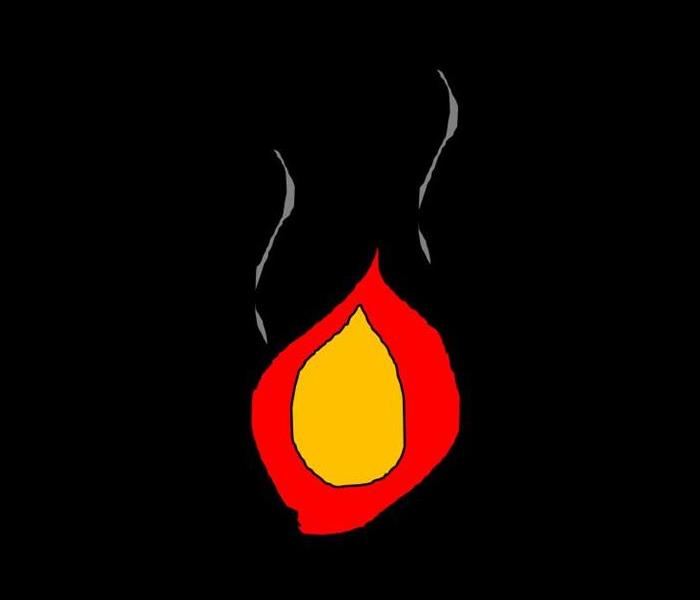 A small fire can gather strength quickly. It is important to know and practice basic fire safety to keep you and your loved ones safe.
A small fire can gather strength quickly. It is important to know and practice basic fire safety to keep you and your loved ones safe.
Did you know that every year there are over 360,000 fires in the United States? That’s about 1000 fires a day! Fires destroy countless homes every year. Sometimes these home fires can be prevented by implementing these important fire safety tips in your home:
- Install an adequate amount of smoke detectors and fire alarms in your home. Also, be sure to regularly check that your alarms are working properly and keep up with replacing the batteries
- Always keep lighters, matches and fire starters out of reach of children
- Teach your children basic fire safety rules
- If you smoke, smoke outside
- Don’t leave cooking food unattended
- Shut off appliances when you are done using them. If you leave home then realize you’re not sure you remembered to shut the stove off it’s better to be safe than sorry. Go home and make sure it’s off.
- Keep flammable items a safe distance from lit candles, fireplaces/woodstoves and stovetops.
In the event of a fire, always put safety first. When you are ready for help putting your home back together, call us at (800) 352-7251. We are here to help.
Using a Portable Fire Extinguisher
4/22/2019 (Permalink)
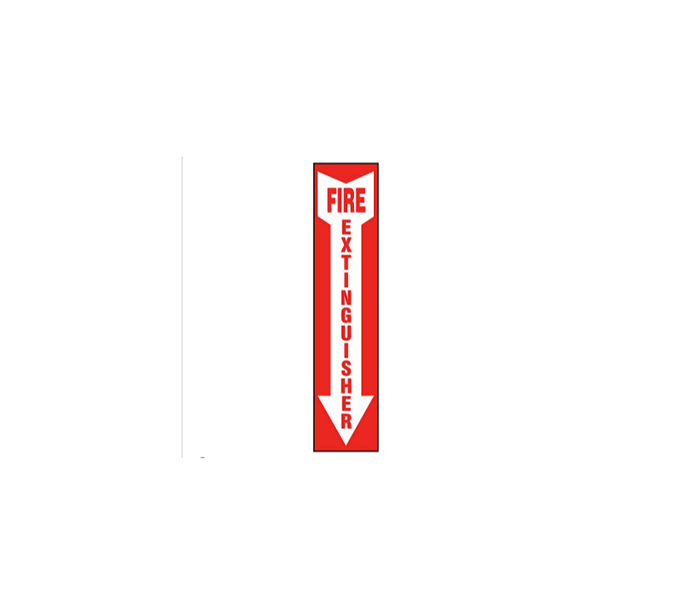 Keep your fire extinguishers in convenient places so that they can be quickly accessed when needed.
Keep your fire extinguishers in convenient places so that they can be quickly accessed when needed.
It is important to have portable fire extinguishers on hand in your home or business. Having and knowing how to use a fire extinguisher can save your building and also your life. The National Fire Protection Association (NFPA) recommends remembering the word PASS in order to properly operate a fire extinguisher:
Pull the pin. Hold the nozzle pointing away from you and release the locking mechanism.
Aim low. The fire extinguisher should be pointed at the base of the fire.
Squeeze the lever, applying slow, even pressure.
Sweep the nozzle from side-to-side.
Familiarize yourself with these steps and with how your fire extinguisher works before a fire breaks out. Also, read the instructions on your extinguisher and remember that it is important to have the correct type of extinguisher. There are different classes of extinguishers designed to treat specific types of fires. For more information on the different types of fire extinguishers, visit: www.nfpa.org
Fire Safety Tips- Grilling
4/15/2019 (Permalink)
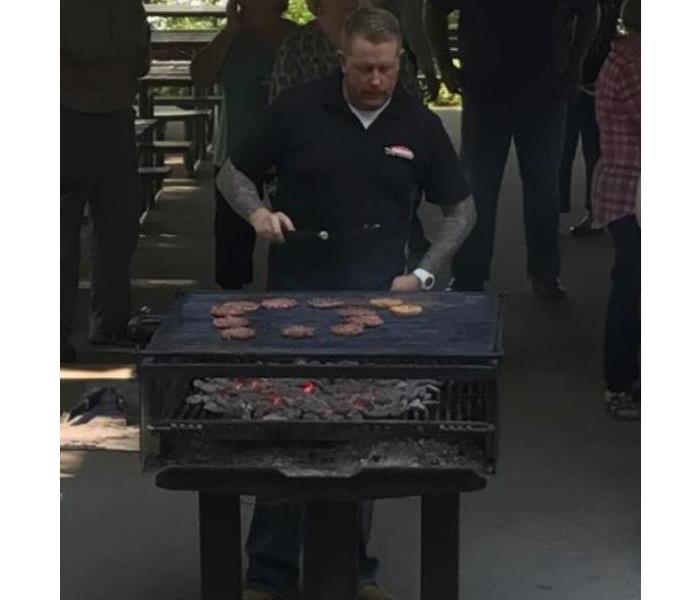 Co-Owner Derek Paul Grilling Up Some Burgers
Co-Owner Derek Paul Grilling Up Some Burgers
It’s so exciting that Spring is here! The snow is going away, trees are budding, and songbirds are returning home. A common favorite during the warm months is to fire up the grill and enjoy some good barbecue in the backyard. Grilling burgers can be fun but there are important safety tips to keep in mind. Here are some tips from the National Fire Protection Association to keep in mind:
- Grill outdoors, away from any structures. Gas and charcoal grills are designed for outdoor use only. Pay attention to overhanging tree branches when you set up your grill.
- Make sure that your grill is stable. Grills should be set up on a flat surface where they won’t tip over or roll away.
- Keep your grill clean. Grease and fat can buildup after cooking. Be sure to regularly clean the grill and the tray. Also, give coals time to cool prior to disposing of them in a metal container.
- Use caution around the grill. Never leave a lit grill unattended. Keep pets and children away from the grill. Remember that a grill will remain hot for at least an hour after use and don’t ever try to move a hot or lit grill.
- Wear appropriate clothing and use caution while cooking. Loose apron strings and sleeves can catch fire.
- Be ready to extinguish the fire. Have baking soda on hand to put out grease fires and a fire extinguisher nearby for other fires.
Fireplace Safety
3/26/2019 (Permalink)
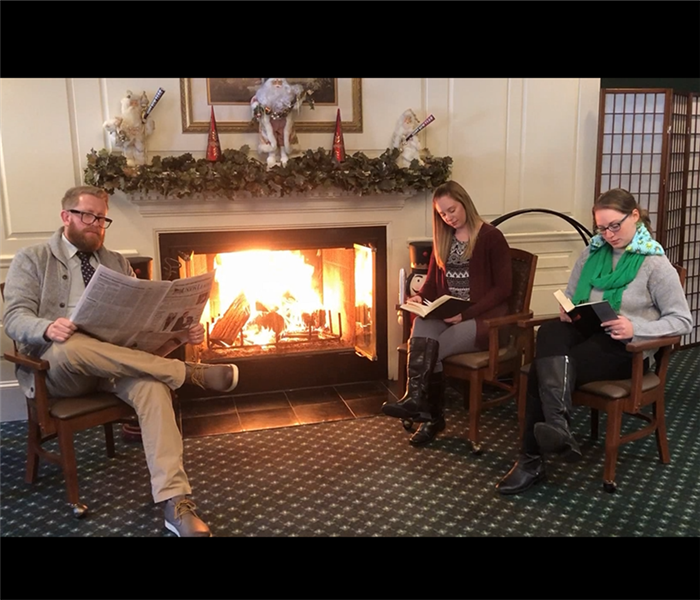 SERVPRO of Cheshire County Marketing Team Enjoying A Cozy Fireplace In Langdon, NH
SERVPRO of Cheshire County Marketing Team Enjoying A Cozy Fireplace In Langdon, NH
It may officially be spring, but there could be some more cold days ahead where you may want to build a cozy little fire in your fireplace. Here are some tips to keep in mind:
- Make sure the fireplace has a sturdy screen to prevent sparks from flying out.
- Be sure the ashes are cool before placing them into a metal container and keep the ashes away from your home, garage and porch.
- Keep any flammable items at least three feet away from the open flames.
- Always use the appropriate type of wood and flame starters when using your fireplace. The dryer the wood the better.
- When installing your fireplace be sure to have a qualified professional perform the installation.
- Make sure you have your fireplace inspected and chimney cleaned according to your local codes and by a professional.
For additional tips and guidelines, consult a professional or visit the National Fire Protection Association’s website: www.nfpa.org
Contact Our Team Right Away After Your Dublin Home Experiences A Fire
10/23/2018 (Permalink)
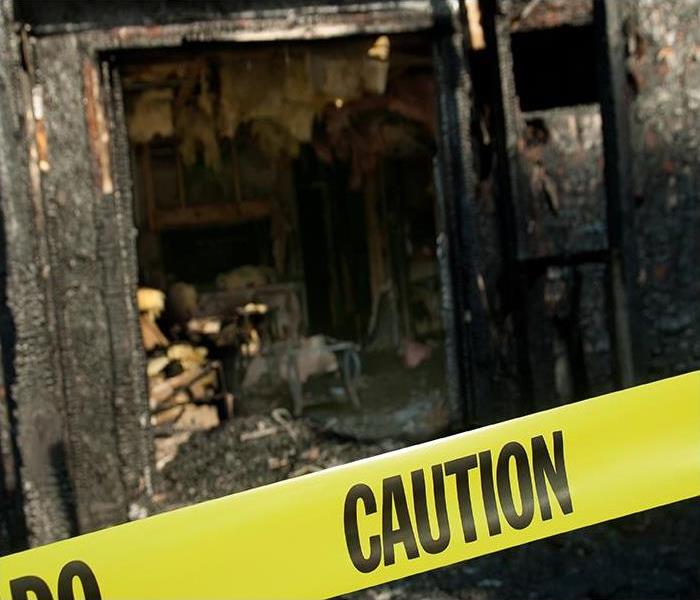 Fire damages are often not difficult to see, even from the outside of your Dublin home if the incident was severe enough.
Fire damages are often not difficult to see, even from the outside of your Dublin home if the incident was severe enough.
The Dangers Of Self-Assessment Of Fire Damage To Your Dublin Home
When disaster strikes your Dublin residence, a homeowner’s first instinct is often to assess the damage for themselves to determine how bad they deem it to be. While many lack the appropriate training and expertise to make accurate assessments, the real concern with this approach is the unknown dangers that could exist throughout the affected property. Especially following disasters like a fire, your home could have potential hazards and risks to your health and safety that should direct you away from doing this part yourself.
Fire damages are often not difficult to see, even from the outside of your Dublin home if the incident was severe enough. With an array of effects that could exist following the extinguishment of the flames, not to mention the secondary effects like water damage from the firefighting efforts, your home requires a trained eye to determine what it needs and how to restore it completely. Our SERVPRO estimator can discover the full scope of the damage, catalog damages and photograph evidence for your insurance provider, and estimate the cost of the restoration, all with a safety-first mentality.
Our technicians not only get trained to contend with all manner of fire restoration and overcoming effects from an array of sources and affected materials, but safety training is an utmost priority for our team. With risks like weakened structural components, toxic environments, smoke, and other indoor air quality concerns, the appropriate personal protective equipment is essential when beginning restoration on a fire-damaged residence.
Getting a SERVPRO estimator in before you contact your insurance company can help to make the claim process more efficient. Our crew is familiar with the requirements of insurance adjusters during this stage and can have the appropriate documentation available and ready, so there is no delay in getting the work done to restore your home.
As tempting as it might be to assess the damage to your house on your own following a disaster like a fire, it is not a safe choice to make. You can always trust in the expertise and fast response of our SERVPRO of Cheshire County technicians whenever disasters strike. Give our emergency response team a call today at (603) 352-7251.
Click here for more about Dublin.
Fire Damage Experts in Jaffrey Talk About Sorting Clean and Claim Items
9/16/2018 (Permalink)
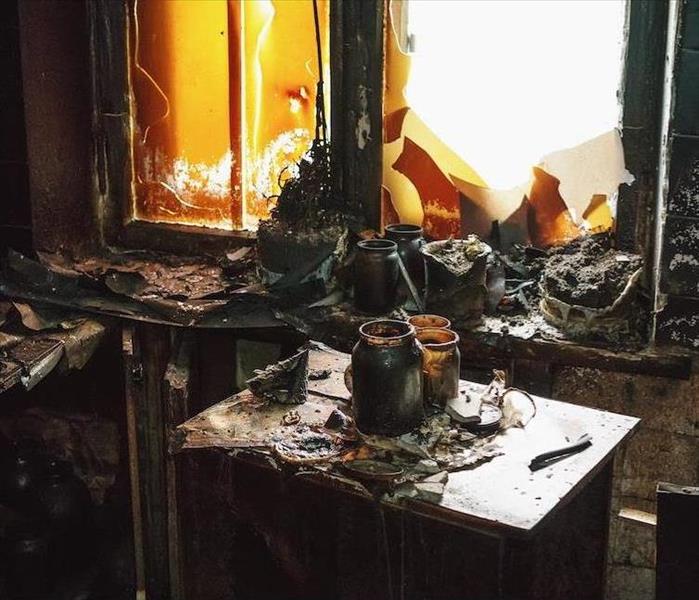 Both wet and dry smoke can affect your household items during a fire. Contact SERVPRO to help you through this tough time.
Both wet and dry smoke can affect your household items during a fire. Contact SERVPRO to help you through this tough time.
Team SERVPRO can Help Determine Which Items Need Replacement and Which can be Refinished
If a fire ever ignites inside your Jaffrey home, several different types of problems can take place. All of the conditions created during the blaze including excessive heat and smoke can cause fire damage to your property. The heat coming from the burn can char items forcing them to be refinished or replaced. Smoke consists of partially combusted materials and can also ruin things by coating them with soot residues and making them smell burnt. When mitigating fire damage, our SERVPRO technicians address problems with both heat and smoke.
Once the blaze ignites, it can spread quickly using anything in its way as fuel to grow. The smoke created during a fire damage project in Jaffrey can vary depending on what was burned and how hot the fire was. When things burn hot and have plenty of oxygen the smoke created is called dry smoke. When items burn more slowly and are oxygen-starved wet smoke is put out. In most cases, a structure will get affected by various amounts of wet and dry smoke.
Dry smoke tends to be less sticky and does not adhere well to surfaces making it easy to clean off. Whereas, wet smoke adheres very well to most surfaces and can sometimes be impossible to remove. In some situations, our SERVPRO team is unable to clean items that are covered in soot residues, and they must be replaced.
Whenever we are dealing with affected contents of your home, we keep a detailed inventory list of everything that was in the affected area. During the initial estimate, our estimators use a test cleaning kit to determine what we think we can restore and what must be replaced and counted as a loss. We then keep track of each of your items and sort them in either the "clean" or "claim" category.
Objects only become claim items when we know for sure that we cannot restore the item. Some items that are questionable we will record the chances that we can get the item cleaned as a percentage. For example, if we think there is a 70% chance that we can restore an item by cleaning we will record that in the inventory list and initial estimate.
After a fire ignites inside your house, call SERVPRO of Cheshire County at (603) 352-7251 immediately.
Click here for more information on the city of Jaffrey.
Understanding the Behavior of Smoke Helps in Restoring Your Dublin Home During Fire Damage
8/31/2018 (Permalink)
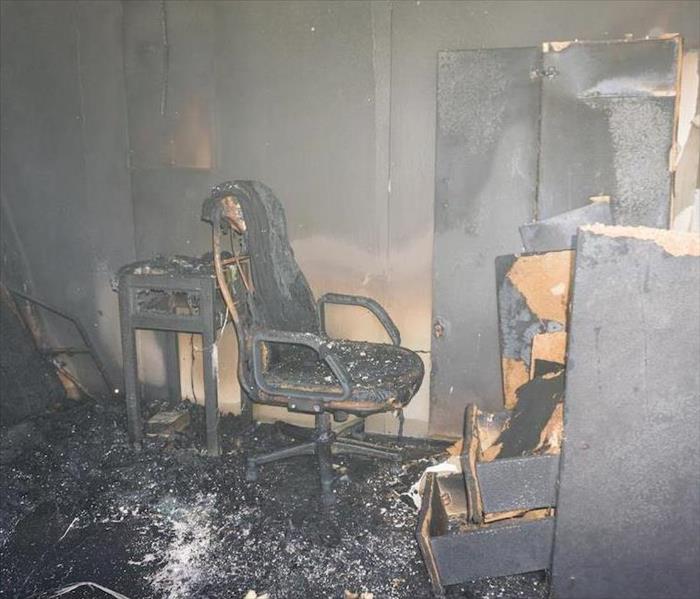 Contact SERVPRO if any room in your home suffers from fire damage. We are quick to respond and understand how that creates the best results.
Contact SERVPRO if any room in your home suffers from fire damage. We are quick to respond and understand how that creates the best results.
SERVPRO Technicians Use Their Knowledge of What Happens During a Fire to Help Remediate the Damage Left Behind
Fire damage restoration is all about removing the soot particles which adhere to surfaces and some of your materials. To effectively restore your property to its earlier state, it is vital to understand the behavior of smoke during the combustion process. With that knowledge, we are in a position to know where to find the lightest and heaviest smoke residues. Here, we are going to look at how the temperature of the surrounding areas and that of the smoke affects how restoration work in Dublin.
When your Dublin property experiences a fire damage incident, our SERVPRO team understands that the transfer of heat in the air is through a process known as convection. Since hot air is less dense when compared to cold air, it rises and displaces the colder air above it. This process goes on and on until the fire goes off. I hope you now understand why you usually see smoke residues around the ceiling area.
When there is too much heat in the structure, the surface's pores open and lead to deeper penetration of the residues. When that happens, it is hard to clean the smoke particles. In some cases, you can easily see heat lines in areas where the temperature was so high during the fire. When the fire is smaller, and its source is in a raised area, you may witness little smoke damage in regions under its source. When our SERVPRO technicians are restoring your property, we ventilate the site immediately to reduce additional damage from taking place.
At the same time, the movement of hot smoke is towards colder areas. During that movement, the colder air around the cold surfaces moves down as it is being replaced. It is the reason why our SERVPRO technicians usually find smoke deposits around colder surfaces such as closed drawers, unheated rooms, closets and outside windows.
SERVPRO of Cheshire County is a trusted service provider in commercial and residential restoration. Call us at (603) 352-7251 when you urgently need cleaning services at any time of the day.
Click here for more about Dublin.
Creosote in Your Dublin Chimney can Cause Fire Damages
7/22/2018 (Permalink)
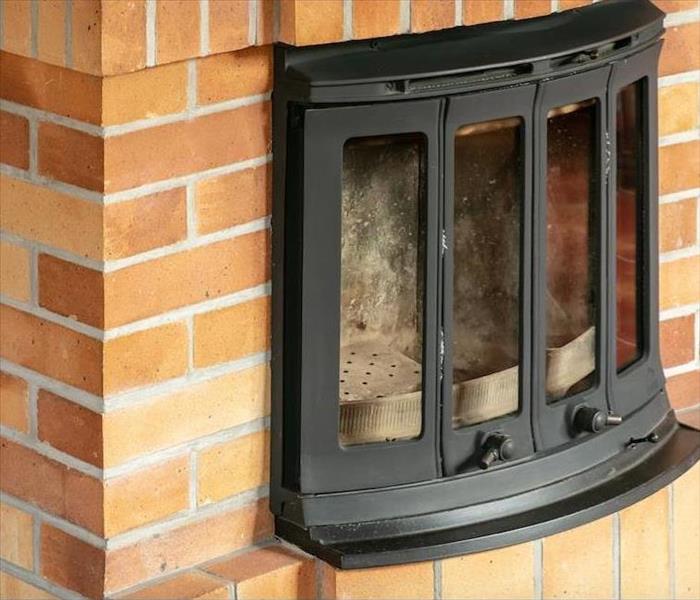 Fireplaces add a warm ambiance to your home but need to be maintained regularly. Contact SERVPRO after a fire for remediation as well as prevention.
Fireplaces add a warm ambiance to your home but need to be maintained regularly. Contact SERVPRO after a fire for remediation as well as prevention.
SERVPRO Tackles Fire Damage as Well as Offering Prevention Tips for Reducing Any Future Fires
Chimneys are a vital component to many Dublin homes. While in the warmer months of the year, the fireplace or furnace in your home gets used very little, understanding the risks of having a chimney at all, or improperly using it, can help keep your family safe and reduce the risk of fires breaking out in your home.
The more that you know and appreciate about your fireplace, furnace, and chimney structure, the better able you are to prevent unfortunate circumstances which lead to fire damages in your Dublin residence. Our SERVPRO professionals have responded to many fires which originated from one of these elements, and so it is important to understand the risks involved.
One of the first things that you need to consider is a build-up of creosote in your chimney flue or liner. These situations are usually a direct result of burning wood in a fireplace or having a wood burning stove that serves to distribute heat throughout the entire house. This build-up can pose a significant risk to those living in your house.
Creosote is a chemical product of unburned gases causing condensation on the hot walls of your chimney lining. These gases are released almost specifically when wood gets burned. As this by-product accumulates in the chimney, it ultimately gets substantial enough to be a fuel source for spontaneous fires breaking out in your chimney.
These fires can spread quickly and burn very hot, causing much structural destruction and irreparable damages to the contents of your home in the affected areas. Fortunately, our SERVPRO team can arrive quickly once the fire is out to help you clean up the mess.
Avoiding this unfortunate circumstance is often as simple as getting your flue and chimney inspected every fall before you start heavily using it. This chute might need to get cleaned before it can be safe to operate again for the next season.
If the unfortunate fire has already taken place, you can depend on our SERVPRO of Cheshire County team to help you clean up the mess and restore the damages that have occurred. Give us a call today at (603) 352-7251.
Click here for more information on the city of Dublin.
Characteristics of Smoke from Fire and Fire Damage in Your Jaffrey Home
4/15/2018 (Permalink)
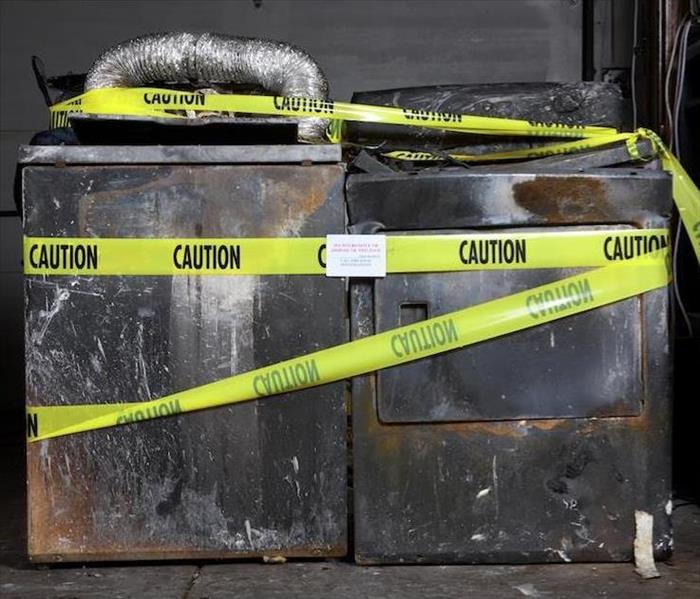 Dryers and lint can, unfortunately, be the cause of a fire in your home. Contact SERVPRO to discuss remediation and fire prevention tips.
Dryers and lint can, unfortunately, be the cause of a fire in your home. Contact SERVPRO to discuss remediation and fire prevention tips.
Team SERVPRO Understands the Fire Process, and How to Best Remediate the Damage Left Behind
Not many people in Jaffrey consider the danger of their clothes dryer in regards to fires. Sometimes a faulty appliance is to blame, but many fires can be prevented with the proper venting of your dryer. Reduced airflow from lint accumulation provides the perfect conditions for a fire. Lint is extremely combustible, so keeping your dryer free of it is essential.
Many newer homes have dryers located away from an outside wall, which means they are vented longer distances, and there are more places for lint to gather. Your home could be at more risk for fire and fire damage in Jaffrey from a lint buildup if your dryer has more extended venting. If you have experienced a fire already, contact our professional staff at SERVPRO for help restoring and repairing your home.
When dealing with fire damage of any kind, we also deal with smoke and smoke damage. During a fire, as burning materials decompose, they release gases, solid particles, and aerosols which become suspended in the air. These suspended gases, particles, and aerosols make up smoke.
The invisible components of smoke are gases. Oxides of nitrogen are made when organic compounds burn, and sulfur dioxide is made when inorganic compounds burn. SERVPRO techs understand that some of the gaseous by-products from a fire, like hydrogen cyanide and carbon monoxide, are very dangerous if people are exposed to the smoke during the fire. Once it has been extinguished, and the smoke has been dispersed and evacuated, gases are not a significant factor.
Besides fire gases, smoke consists of aerosols and fine particles as well. The solid particles of material that are not burned are usually small particles of carbon. Aerosols are very fine liquid or solid particles which are suspended inside gases. The particles, while suspended, are what makes smoke visible to us. They absorb odors, making soot stink.
Once smoke settles on surfaces, it is known as soot. These residues can contain different acids since sulfides and chlorides in smoke combine with humidity in the air or with moisture to make acids. Acidic soot residues cause corrosion and discoloration of materials over time.
Because of this, SERVPRO of Cheshire County works quickly to clean the residues from your home in Dublin, Swanzey, or Fitzwilliam after a fire, helping to prevent additional damage. As soon as the fire is out, contact us at (603) 352-7251 so we can restore your home in a timely fashion.
Click here for more about Jaffrey.
Avoid Obvious Mistakes When Fire Damage Occurs in Your Keene Home
3/13/2018 (Permalink)
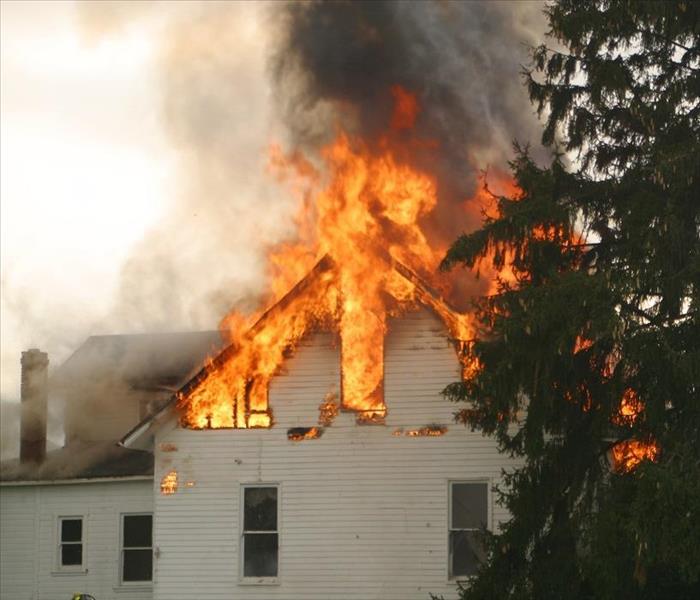 Attempting to clean fire damage on your own can cause further damage to your home.
Attempting to clean fire damage on your own can cause further damage to your home.
Rely on Professionals for Proper Fire Damage Remediation
Most of us are anxious to clean our homes after a fire damage incident, but did you know you might waste your time and cause further damage if you do not seek professional assistance? If you are insured, working towards reducing the claims is necessary at this stressing time. Not all buildings in Keene are safe to re-enter after such incidents; it is crucial first to do a pre-inspection.
Our SERVPRO technicians can help you prevent further fire damage in your Keene property. If there is some water on your property, we work towards drying the area. We achieve this by installing fans and ventilation in the rooms. If the incident took place during warm weather, we could run a dehumidifier once we have shut all the windows. Sometimes when the weather is cold, we can opt to operate your heating system, and the cold air can help in moisture removal.
If you fail to thoroughly dry draperies, floors underneath and carpets, mold can start to grow and lead to permanent damage. We also know that copper and brass can corrode after exposure to smoke, so we use a copper cleaner to do the cleaning. As a safety measure, we wrap furniture legs using aluminum foil and remove oriental rugs from wet carpeting.
Soot is oily and to protect your household textiles, draperies and carpets from possible stains, our SERVPRO team attempts to remove it before deodorizing and cleaning items. When removing it, we may hold an operating vacuum cleaner nozzle just above the area with the stain. We avoid using an upright vacuum or vacuum attachments since the soot may be forced into the fabrics by the brushes.
Our team from SERVPRO also performs deodorization to remove smoke odor from draperies, carpets, and upholstered furniture. The deodorants that thermal foggers dispense eliminate the odors by neutralizing and breaking up their molecules.
SERVPRO of Cheshire County is an industry leader in commercial and residential restoration. Call us at (603) 352-7251 when you need remediation services, and we can make it "Like it never even happened."
Click here for more information regarding the city of Keene.
Smoke and Fire Damage from Matches in Keene
1/3/2018 (Permalink)
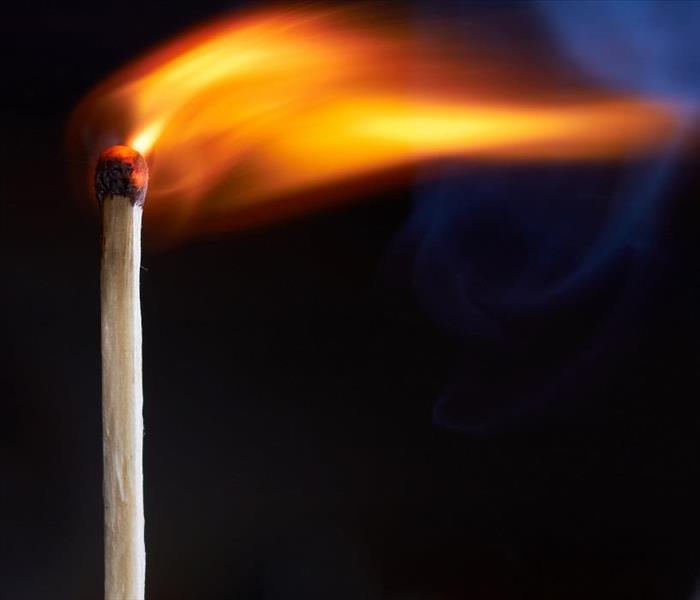 A simple match can cause fire damage to your home, call SERVPRO immediately after the fire is out if you experience a house fire.
A simple match can cause fire damage to your home, call SERVPRO immediately after the fire is out if you experience a house fire.
SERVPRO's Highly Trained Technicians Understand the Smoke Damage Left Behind by a Fire
Some children in Keene have a fascination with fire, and the opportunity to play with matches presents a huge temptation. However, it is a dangerous situation as well, since most children do not realize how easily a fire can start and how quickly they can spread throughout a home. Many times, fires are caused by children playing outside with matches and the wind catching fire.
Matches need to be kept out of reach of any children, but sometimes accidents still happen. Fire and fire damage to your Keene home from matches is an unfortunate and hard lesson for anyone to learn. Once the fire is out, your home needs the help of professionals to get it cleaned and repaired back to its original state. SERVPRO has the training and tools to get the job done correctly and in a timely fashion.
One thing we have to fully understand about a fire is the smoke damage that is left behind. As smoke travels from its source, it flows around your home and obstructions with the air current which arrives it. Each thing in the way tends to pick up residues from the smoke as it passes by, acting as a filter. The farther the smoke travels from the source, the fewer residues it has.
SERVPRO techs know that smoke follows airflow patterns throughout your home, spreading residues within the structure. Convection currents many times follow the direction of heating mains and tubing in homes where hot water heating is. Smoke goes upward behind radiators, which results in more substantial deposits on walls right about these units.
Some areas of your home get more smoke residues than others because of the airflow pattern. The cavity above a suspended ceiling can also serve as an air return and have heavier smoke deposits than the ceiling underneath it. The cavity can spread residues to a broader area of the home as well.
Closed doors do not stop smoke. We might find heavier concentrations around or under closed doors, around the edges of carpets, and around cracks. As the smoke flows around and through cracks, it deposits heavier concentrations of residues.
SERVPRO of Cheshire County understands all the places to check for smoke and soot residues so that we can thoroughly clean your home after a fire to make it safe again for you and your family. Residents in the areas of Swanzey, Dublin, and Fitzwilliam should call us as soon as the fire is out at (603) 352-7251.
Click here for more information regarding the city of Keene.
Professional Fire Damage Restoration Services For All Rindge Area Residents
11/12/2017 (Permalink)
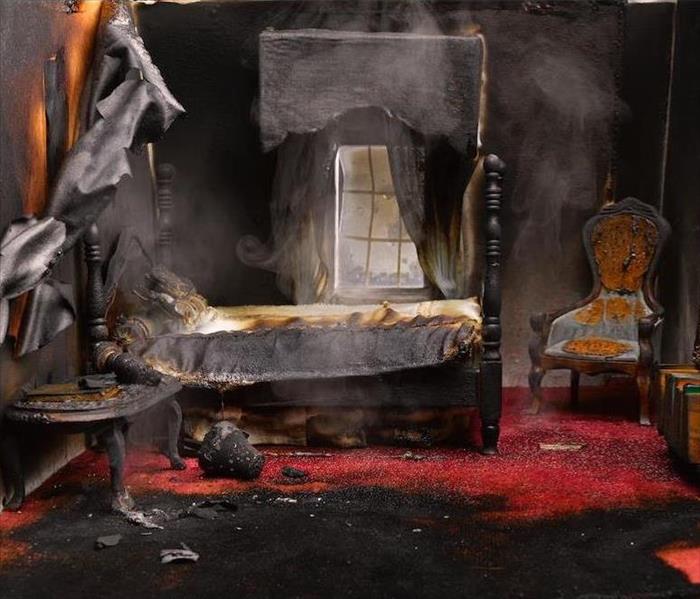 Getting help quickly from a professional fire damage remediation company like SERVPRO can help save your home from secondary damages.
Getting help quickly from a professional fire damage remediation company like SERVPRO can help save your home from secondary damages.
SERVPRO Technicians Remediate the Damage After a Fire in Your Home
Dealing with damages caused by a fire on your Rindge area property can be a huge pain. Damages as a result of flames themselves, traveling smoke, or lingering residues and water exposure all require specific attention, as fast as possible. If you fail to get professional help immediately, additional damages can occur, making your home’s restoration take even longer.
With that said, there are highly-trained IICRC-industry certified professionals available throughout the area. We specialize in fire damage restorations in Rindge, providing you with the qualified help you deserve. Our technicians can help get things back to normal as fast as humanly possible while maintaining the quality service level you expect.
SERVPRO technicians are available 24-hours a day, 7-days a week, regardless of when an emergency event occurs. By working with your insurance company, we help restore your home to a quality pre-damage condition and reduce repair costs associated with your restoration as much as possible.
SERVPRO gives you access to a variety of water removal equipment that helps with getting excess moisture from firefighting efforts out of your home before corrosion, rot, or mold becomes a problem. We also have fire damage restoration specialists that take the time to address damages to each item found in your home thoroughly, saving as many of your belongings as possible.
Smoke, soot, and other residues can travel farther and cause even more damage than the flames from a fire. Giving each area the proper attention involves using hands-on cleaning techniques that vary from job to job. Your home may require more detailed cleaning or have additional safety concerns that you may not be aware of without professional help.
SERVPRO technicians take restoring your home to the next level; we provide you with expertly planned out services and help return your home to a quality condition you can enjoy. We keep you informed throughout the process and confident that you made the right choice.
SERVPRO of Cheshire County is your answer for fire-related emergencies that occur in your home. We are a locally owned and operated business that cares about our local community; call today. (603) 352-7251
For more information about the City of Rindge, New Hampshire visit: http://www.rindgenh.org/
Solutions To Lingering Smoky Smells After Rindge Fire Damage
10/24/2017 (Permalink)
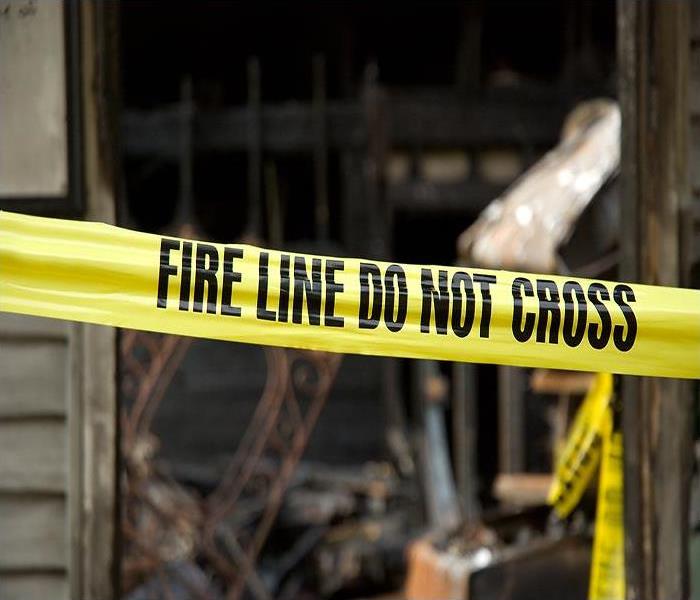 Recovery after a home fire is a complicated maze of clearing debris, remediating water damage, cleaning up soot and other residues, and repairs.
Recovery after a home fire is a complicated maze of clearing debris, remediating water damage, cleaning up soot and other residues, and repairs.
Lingering Smoky Smells After A Fire
Recovery after a Rindge home fire is a complicated maze of clearing debris, remediating water damage, cleaning up soot and other residues, and performing repairs and decorative touch-ups. Experience, training, and cutting edge-equipment permit our specialists to deliver a restored building, clean and inviting. Residual smoky and other fire damage derived odors that persist, however, indicate the job is not complete.
Depending on the source and the fuel, fire damage odors in Rindge can remind homeowners of the disaster for a long time after restoration. Smoky odor has a severe effect on the emotional health of the family who almost lost everything in a fire. Fortunately, effective and permanent deodorization strategies are available, and we make sure our work crews train at both basic and advanced levels, able to liberate your home from these disturbing and unpleasant smells.
Deodorization is a four-step process and sometimes requires a step to be repeated to eradicate an odor. Individuals also experience smells differently. SERVPRO pledges to work with homeowners until every member of the family is comfortable in feeling that the fire damage odors are no longer detectable.
First, SERVPRO crews remove the source of the odors. Much of this happens during the general cleanup, but a search for odor-bearing materials after the initial physical restoration may reveal charred or melted objects in hidden or overlooked areas. Properly discarded, removal of these objects eliminates the cause of the smell.
Second, SERVPRO crews clean surfaces coated with odor-causing residues. Residues removed in the original clean-up may leave an almost undetectable layer that continues to emit odor-causing particles. Odors also migrate during and after fires to areas of the home seemingly unaffected. A thorough cleaning where odors are detected, perhaps with stronger cleansers and solvents, may take care of the odor.
Third, SERVPRO crews troubleshoot any odors that persist by using odor neutralizing techniques that recreate the conditions helped odors to penetrate and migrate. Flooding areas with sanitizing, neutralizing, and digesting professionals products, paralleling the water used to extinguish the fire, may work for water-borne odor. A spray or thermal fogger that mimics the combustion that spread odor carrying particles may defeat air-borne smells.
Specialized equipment such as hydroxyl generators or, in extreme circumstances, ozone machines is another resort for tough odors. As with thermal fogging, these machines cause a process that changes the chemical composition of the odiferous particles, rendering them odorless.
Fourth, SERVPRO crews consider sealing surfaces to prevent the odor vapor from releasing into the air, a technique used in situations where other methods are impractical. Examples might be painting walls and trim or coating interiors of HVAC systems with sealants.
SERVPRO of Cheshire County intends to restore every aspect of your home after a fire and perseveres even with challenging tasks like deodorization. Call (603) 352-7251 to get the recovery work rolling as soon as the firefighters release your property back to you.
Click here for more about Rindge.
Professional Remediation of Smoke and Fire Damage can Save Your Dublin Apartment's Deposit
9/12/2017 (Permalink)
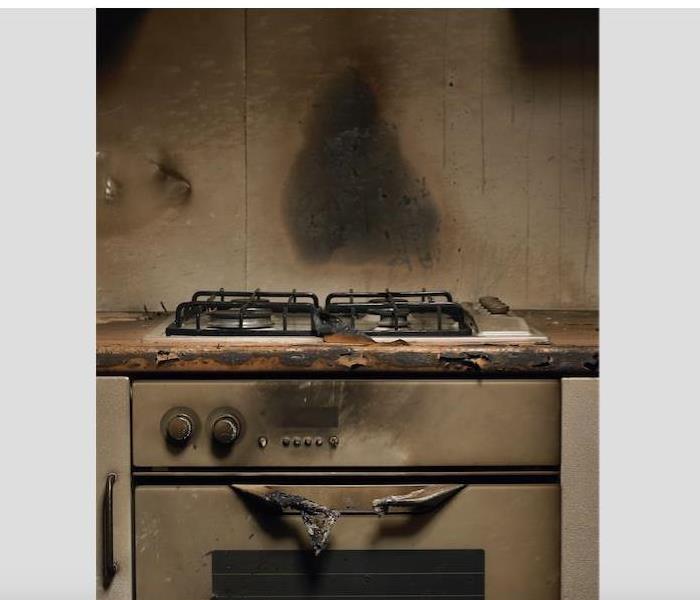 Smoke and fire damage can make your apartment uninhabitable. Contact SERVPRO and we'll work on getting you back your entire deposit.
Smoke and fire damage can make your apartment uninhabitable. Contact SERVPRO and we'll work on getting you back your entire deposit.
SERVPRO Technicians Expertly Handle Your Smoke and Fire Damage Emergency
Few landlords in Dublin deem 'normal wear and tear' to include smoked-up walls or charred carpet holes. Finding this kind of damage in a dwelling during a move-out inspection is often grounds for forfeiture of the deposit paid when you first moved into the unit. Therefore, restoring your apartment's interior when such situations exist becomes crucial to have your funds returned to you when moving to another location.
Renting an apartment can help you save money for larger purchases, but unrepaired smoke and fire damage in Dublin can take that all away from you. Smoke damage can cause the same problems. SERVPRO can remove the signs that a problem ever existed so you can present your former home to the landlord in as good, if not better, shape in which you first rented the unit.
We specialize in removing all traces of the damage like greasy cooking messes, cigarette smoke, small burn marks on carpets and other surfaces, and other visible evidence. Strong odors can also create problems with a landlord who believes that it could cause future tenants to refuse to rent the unit, but we can eliminate bad odors, also.
Because we maintain a high level of discreteness when dealing with our clients, you can rest assured that we never divulge your apartment's details to your neighbors. We also aim to provide the highest possible quality services, so we take the time to earn IICRC-backed certificates in Carpet Repair and Reinstallation (RRT) and Fire and Smoke Restoration (FSRT). Regardless of how bad you might think a situation is, we can help. When we finish, your apartment should look and feel “Like it never even happened.”
At SERVPRO of Cheshire County, we include the renters in our community as vital partners in our local economy. Without rental income, property ownership in our area would not thrive. For all your smoke and fire damage needs, contact us at (603) 352-7251, 24/7, every day of the year.
For more information regarding Dublin, click here
Why Fire Damage Remains One of the Worst Catastrophes a Keene Area Home Withstands
5/30/2017 (Permalink)
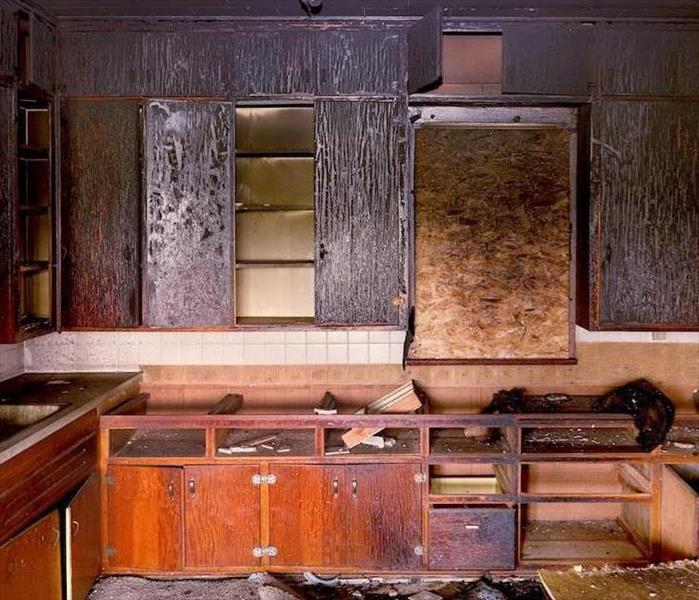 Fire damage is not something that a family wants to experience. But if it does happen, SERVPRO can be your ally through the entire process.
Fire damage is not something that a family wants to experience. But if it does happen, SERVPRO can be your ally through the entire process.
SERVPRO Technicians React Quickly SO that Items can be Repaired Rather than Replaced
Your home may be built rock-solid, but fire can affect even the strongest and best-built homes anywhere in surprising and unexpected ways. When fire strikes, smoke is also produced. This smoke is not the only other aspect to a house fire besides the fire itself.
Keene area homes that suffer from having fire damage also have other problems. Smoke, as noted above, as well as water from firefighters' hoses, left-over chemicals, such as foaming agents, used to extinguish fires, and soot deposits are prevalent problems.
These different aspects of a fire and the efforts to put that fire out are why fire damage can be one of the worst types of damage a home might ever sustain. After a fire, and only when it is safe to enter, does a family often have their first look at how much damage has been done to their home and their personal belongings. Doing this can be a very traumatic event in a person's life, and this alone can add to the overwhelming feeling of loss.
At SERVPRO, even though we see this kind of destruction on a constant basis, we always know that the damage is new to our customers. We fully understand that it may seem insurmountable to the family, but we also can guide them in how to recover in the fastest manner possible. Because of the high possibility that water has damaged more than the structure but also much of the contents inside the home, contents that may have been irreplaceable, we always are available to explain the options available in restoring different types of materials. It is not only the home that needs to be restored after a fire. We also restore the home's contents.
When water has damaged photos, we have access to photograph restoration experts. Books? Not a problem, as we have lyophilization capabilities with other SERVPROs located nearby. Clothing soiled by soot and saturated with water? We can wash those items at our site so that mold and mildew have no chance to begin growing, creating more damage. Children's toys and furniture soiled and filthy because of the smoke that swirled around them? We have that covered, too, and can return them to a like-new state once again, where they are free of any grime or chemicals that could harm your children's health.
If your home has been through a fire, even a small one, we can help. Call us, SERVPRO of Cheshire County at (603) 352-7251, for more information on how we can help you and your family return home, safe and secure, once again.
For more information regarding Keene, click here
Understanding The Behavior of SMOKE
11/9/2016 (Permalink)
The damage to your property following a fire can often be complicated due to the unique behavior of smoke. There are two different types of smoke-wet and dry. As a result, there are different types of soot residue after a fire. SERVPRO of Cheshire County professionals are thoroughly trained in fire cleanup and restorations and know the different types of smoke and their behavior patterns. Knowing this information is vital to proper restoration. Before restoration begins, SERVPRO will survey the loss to determine the extent of impact from fire, smoke, heat, and moisture on the building materials and contents. The soot will then be tested to determine which type of smoke damage occurred. Pretesting determines the proper cleaning method and allows your local SERVPRO Cheshire County to focus on saving your precious items.
SERVPRO of Cheshire County professionals know smoke can penetrate various cavities within the structure, causing hidden damage and odor. Their knowledge of building systems helps them investigate how far smoke damage may have spread. The following are additional facts you may not know about smoke:
- Hot smoke migrates to cooler areas and upper levels of a structure
- Smoke flows around plumbing systems, seeping through the holes used by pipes to go from floor to floor.
- The type of smoke may greatly affect the restoration process.
Different Types of Smoke
Wet Smoke (Plastic and Rubber)-Low heat, smoldering, pungent odor, sticky, smeary. Smoke webs are more difficult to clean.
Dry Smoke (Paper and Wood)-Fast burning, high temperatures, heat rises therefore smoke rises.
Protein Fire Residue (Produced by evaporation of material rather than from a fire)-Virtually invisible, discolors paints and varnishes, extreme pungent odor.
Fuel Oil Soot (Furnace Puff Backs)-While "puff backs" can create havoc for homeowners, SERVPRO Franchise Professionals can, in most cases, restore the contents and structure quickly.
Other Types (Tear gas, fingerprint powder and fire extinguisher residue)- Special loss situations require special care.
SERVPRO Franchise Professionals are trained to handle even the toughest losses. If your home or business suffers fire or smoke damage, contact SERVPRO of Cheshire County to help make it "Like it never even happened."
Celebrate Safely with a Recipe for Safety
11/3/2016 (Permalink)
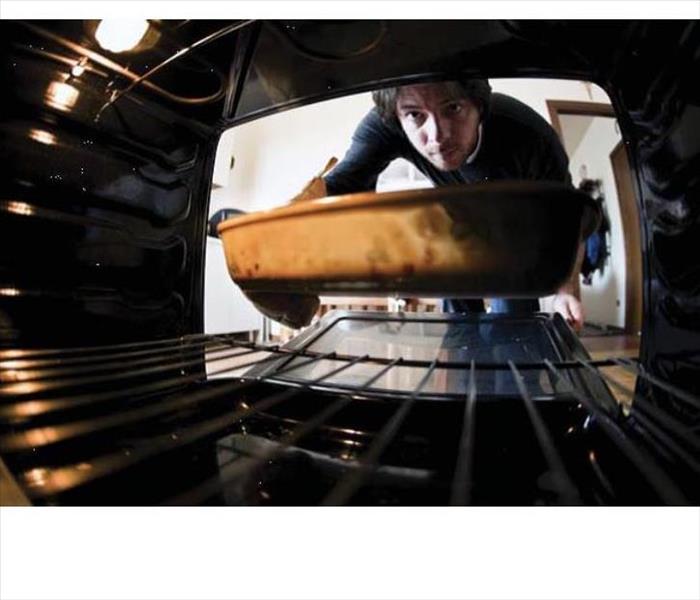 Celebrate Safely
Celebrate Safely
Each November, families gather to celebrate Thanksgiving by preparing a delicious feast, but if you don't practice safe cooking habits, your holiday could become hazardous very quickly. According to the national Fire Protection Association, cooking fires are the number one cause of home fires and home injuries. The leading cause of fires in the kitchen is unattended cooking. It's important to be alert to prevent cooking fires.
- Be on alert! If you are sleepy or have consumed alcohol don't use the stove or stovetop.
- Stay in the kitchen while you are frying, grilling, boiling or broiling food.
- If you are simmering, baking or roasting food, check it regularly, remain in the kitchen while food is cooking, and use a timer to remind you that you are cooking.
- Keep anything that can catch fire-oven mitts, wooden utensils, food packaging and towels or curtains-away from the stovetop.
If you have a cooking fire, consider the following safety protocols to help keep you and your family safe.
- Just get out! When you leave, close the door behind you to help contain the fire.
- Call 9-1-1 or the local emergency number after you leave.
- For an oven fire turn off the heat and keep the door closed.
- If you try to fight the fire, be sure others are getting out and you have a clear way out.
- Keep a lid nearby when you're cooking to smother small grease fires. Smother the fire by sliding the lid over the pan and turn off the stovetop. Leave the pan covered until it is completely cooled.
SERVPRO of Cheshire County wishes you a safe and happy holiday season.
Tips on how to Celebrate Summer Safely
6/28/2016 (Permalink)
 CELEBRATE SUMMER SAFELY
CELEBRATE SUMMER SAFELY
Summer is synonymous with barbecues, parades and fireworks displays; but along with all the festivities are plenty of visits to emergency rooms-especially during July. Each year, around 230 people are injured badly enough to require medical treatment after fireworks-related incidents, according to the U.S. Consumer Product Safety Commission. In addition to causing injury, fireworks are also responsible for thousands of house fires each year with millions of dollars in property damage. There is nothing like firing up the grill during the summer months! Did you know, July is the peak month for grill fires? A backyard barbecue can become dangerous quickly if proper safety precautions aren't considered. Your local SERVPRO Franchise Professionals want you to have an enjoyable and safe summer.Consider the following tips to help ensure your summer celebrations are diaster-free!
- Propane and Charcoal BBQ grills should only be used outdoors
- The grill should be placed well away from the home, deck railing and out from under the eaves and overhanging branches
- Keep children and pets away from grill area
- Keep your grill clean by removing grease or fat buildup from the grills and in trays below the grill.
- Never leave your grill unattended
- When using a charcoal grill, let the coals completely cool before disposing in a metal container
- Anyone using fireworks or standing nearby should wear protective eyewear.
- Do not try to re-light or handle malfunctioning fireworks. Keep a bucket of water nearby to fully extinguish fireworks that don't go off or in case of fire. Children should never pick up fire reworks that may be left oer as they may still be active.
- The safest way to enjoy fireworks is to attend a public display conducted by trained professionals.
Fireworks Facts
- Fireworks cause an average of almost 20,000 reported fires per year.
- In 2013, sparkers caused 41% of fireworks injuries.
- On Independence Day in a typical year, fireworks account for two out of five of all reported fires, more than any other cause of fire.





 24/7 Emergency Service
24/7 Emergency Service







